Experts have warned the public not to change their behaviour after the official UK coronavirus alert level was cut from 4 to 3.
The health secretary, Matt Hancock, hailed the move, which signals that transmission of the disease is no longer regarded as high, as a “big moment for the country”.
He praised the public for their compliance with lockdown rules, and said that it had contributed to bringing the virus under control.
Download the new Independent Premium app
Sharing the full story, not just the headlines
But experts warned that the decision should not be seen as a signal for people to relax their adherence to the regulations.
Gabriel Scally, visiting professor of public health at the University of Bristol and a member of the independent Scientific Advisory Group for Emergencies (Sage), said: “Don’t change anything. Keep on going. The virus is still there.”
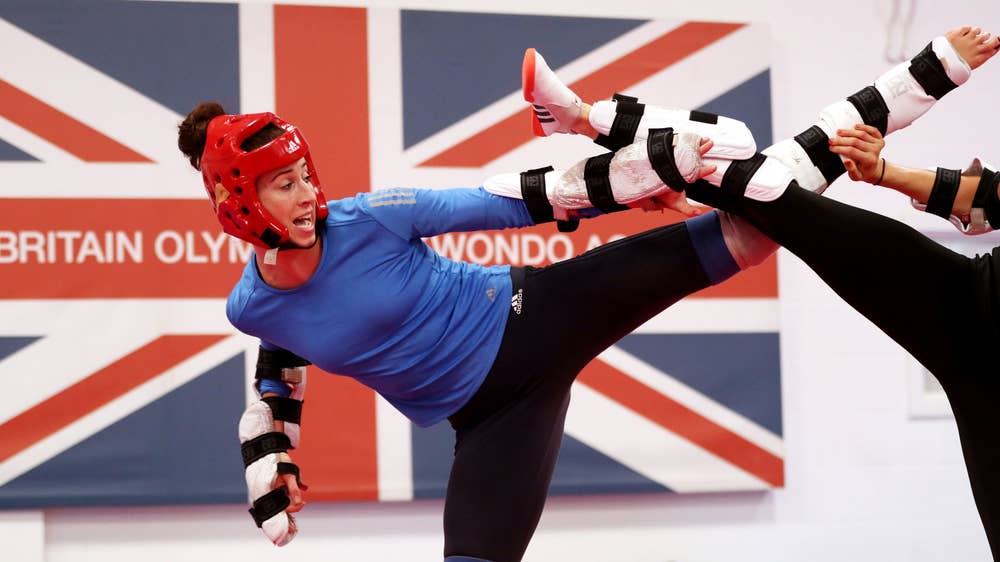
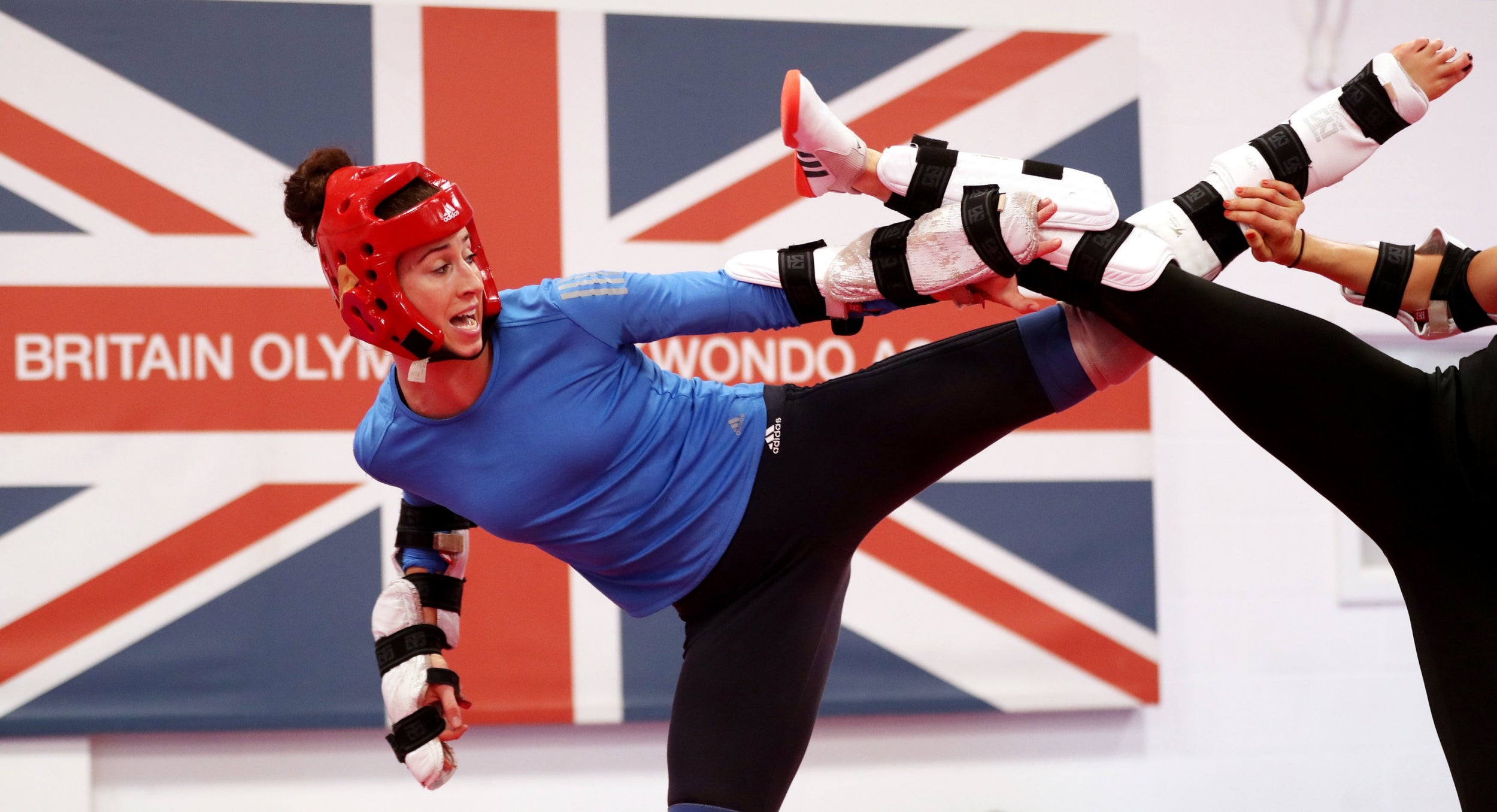
1/50 19 June 2020
Bianca Walkden during a training session at the National Taekwondo Centre in Manchester
PA
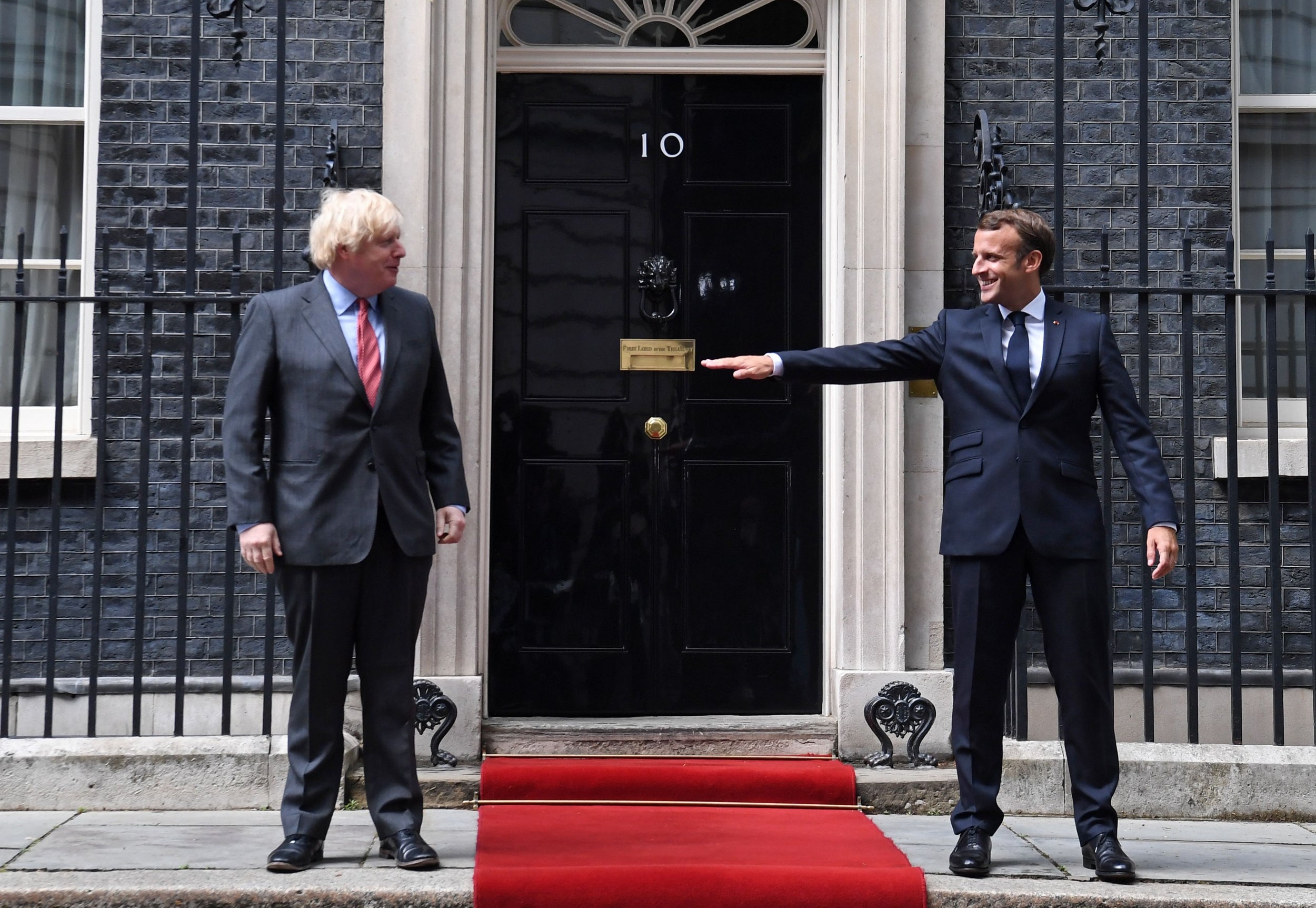
2/50 18 June 2020
French President Emmanuel Macron gestures about social distancing alongside Prime Minister Boris Johnson as he arrives at Downing Street for a meeting. Macron also visited London to commemorate the 80th anniversary of former French president Charles de Gaulle’s appeal to French people to resist the Nazi occupation during World War II
AFP/Getty

3/50 17 June 2020
Players kneel, as well as, having ‘Black Lives Matter’ in place of names on their shirts prior to the start of the Premier League match between Aston Villa and Sheffield United at Villa Park in Birmingham. The league resumed after its three-month suspension because of coronavirus
AP
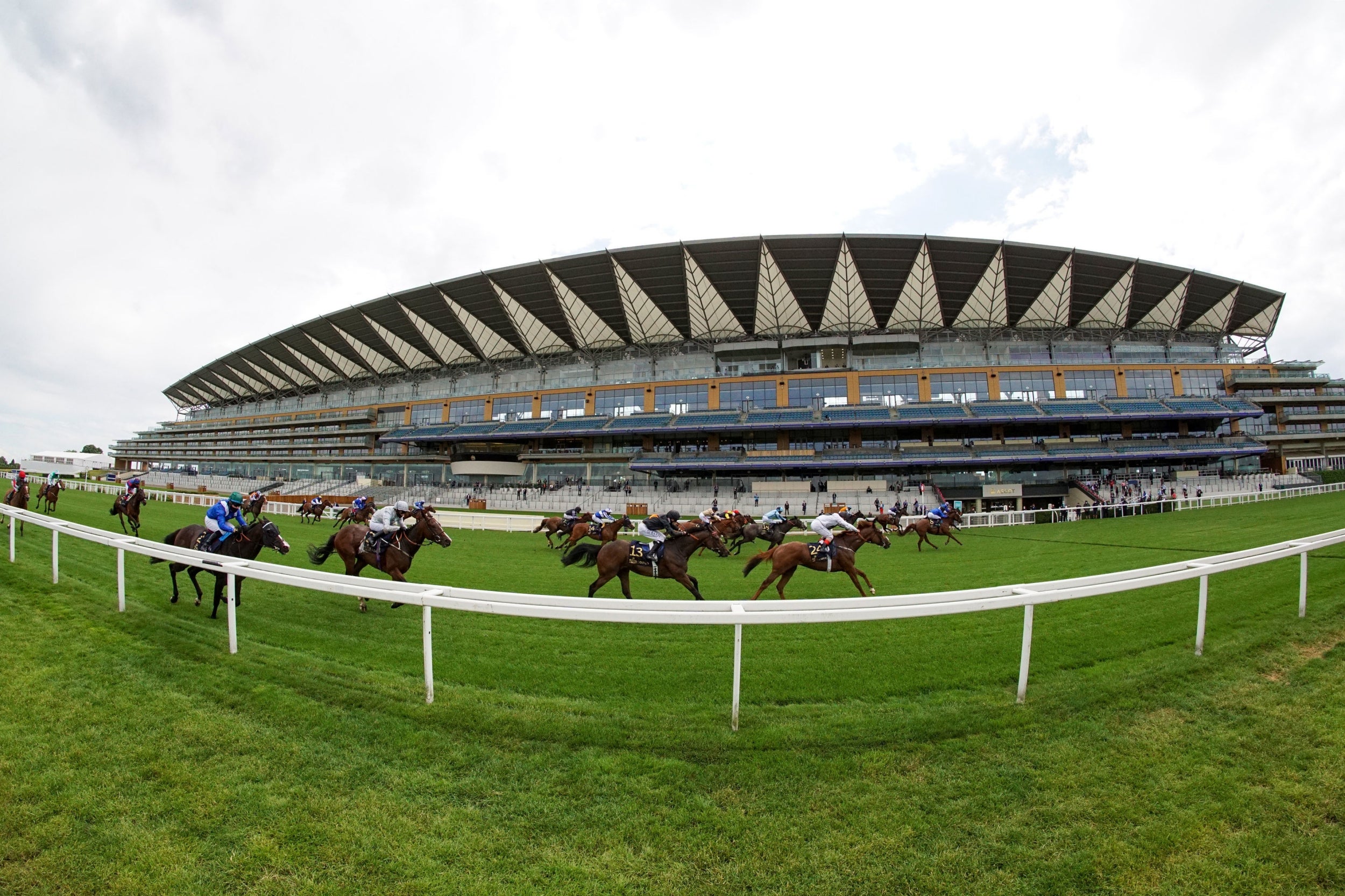
4/50 16 June 2020
Motakhayyel ridden by Jim Crowley, right, wins the Buckingham Palace Handicap during day one of Royal Ascot. This year, the flat racing’s biggest meeting, is behind closed doors due to the coronavirus outbreak
PA
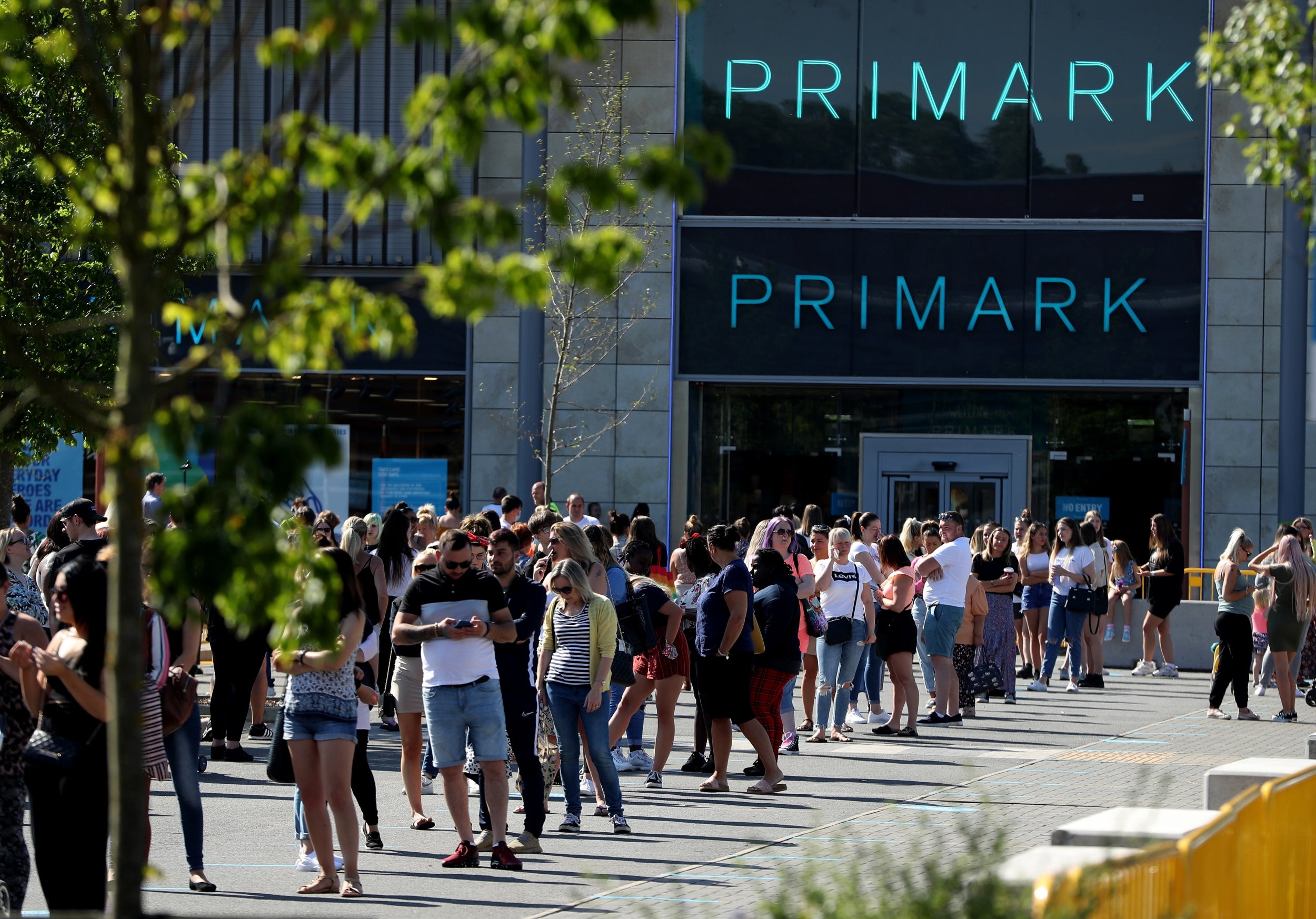
5/50 15 June 2020
Queues form at Primark at the Rushden Lakes shopping complex after the government relaxed coronavirus lockdown laws significantly, allowing zoos, safari parks and non-essential shops to open to visitors
Getty
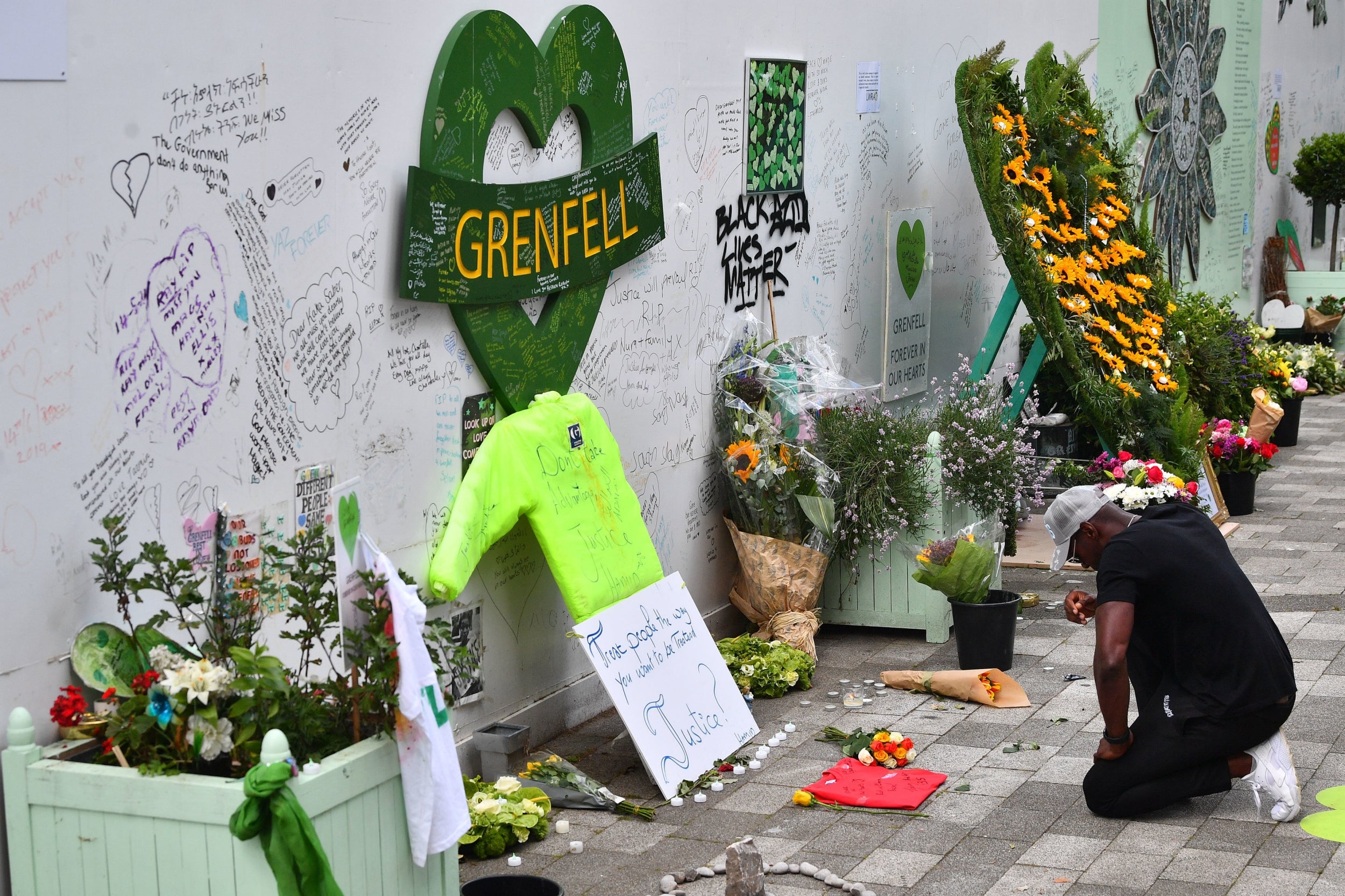
6/50 14 June 2020
A man kneels at a commemoration to mark the third anniversary of the Grenfell Tower fire in London. The fire claimed 72 lives on 14 June 2017
PA

7/50 13 June 2020
Protesters confront police in Whitehall near Parliament Square, during a protest by the Democratic Football Lads Alliance
PA
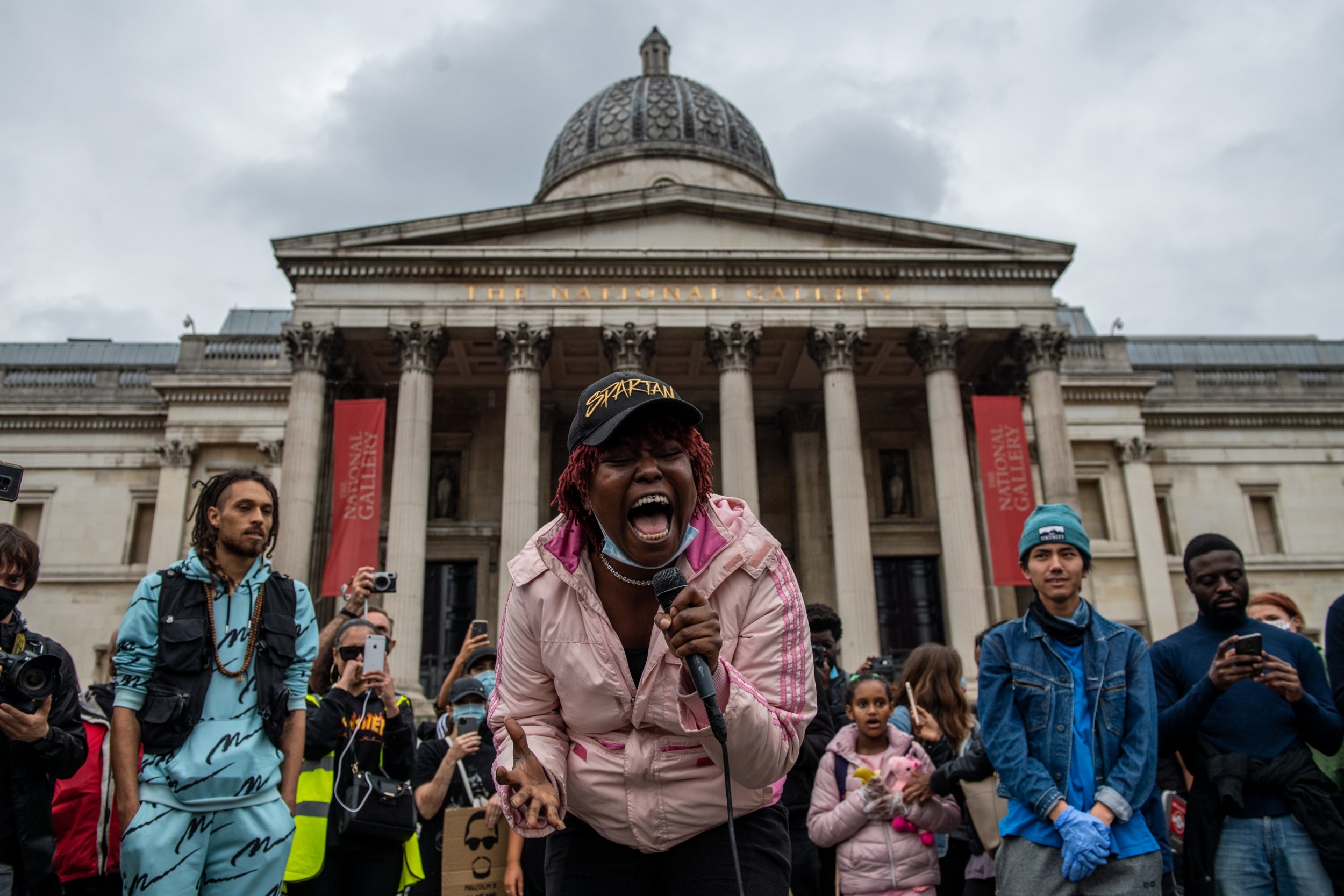
8/50 12 June 2020
A Black Lives Matter supporter sings to crowds who marched with her in front of the National Gallery in Trafalgar Square in London. The death of an African American man, George Floyd, while in the custody of Minneapolis police has sparked protests across the United States, as well as demonstrations of solidarity in many countries around the world
Getty

9/50 11 June 2020
Scouts show their support at the Lord Baden-Powell statue in Poole. The statue of Robert Baden-Powell on Poole Quay is to be placed in “safe storage” following concerns about his racial views
Getty

10/50 10 June 2020
Social distancing markers around the penguin enclosure at London Zoo. Staff have been preparing and are now ready for reopening next week with new signage, one-way trails for visitors to follow, and extra handwashing and sanitiser stations in place
PA
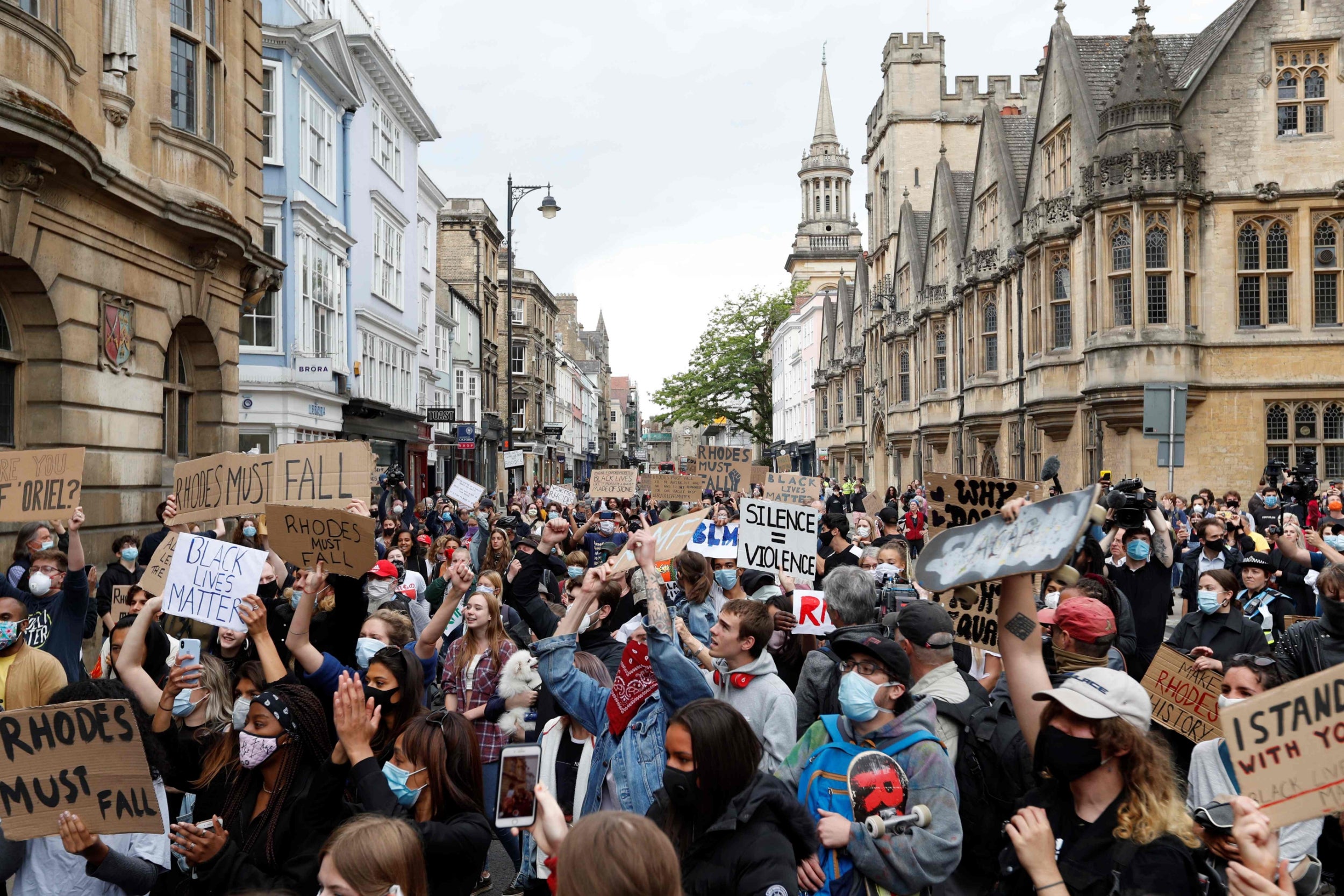
11/50 9 June 2020
Protestors hold placards and shout slogans during during a protest called by the Rhodes Must Fall campaign calling for the removal of the statue of British imperialist Cecil John Rhodes outside Oriel College, at the University of Oxford
AFP via Getty

12/50 8 June 2020
Hermione Wilson helps to install a new artwork at Jupiter Artland, Edinburgh, created as a tribute to the NHS titled “A Thousand Thank Yous” originally devised by the late Allan Kaprow which consists of colourful painted messages on cardboard and has been directed remotely by London-based artist Peter Liversidge
PA

13/50 7 June 2020
The Edward Colston statue has been pulled down by Black Lives Matter protesters in Bristol. Colston was a 17th century slave trader who has numerous landmarks named after him in Bristol
SWNS

14/50 6 June 2020
Children pose for their family in front of discarded placards fixed on a wall in Piccadilly Gardens after a Black Lives Matter demonstrations in Manchester. The death of an African-American man, George Floyd, while in the custody of Minneapolis police has sparked protests across the United States, as well as demonstrations of solidarity in many countries around the world
Getty
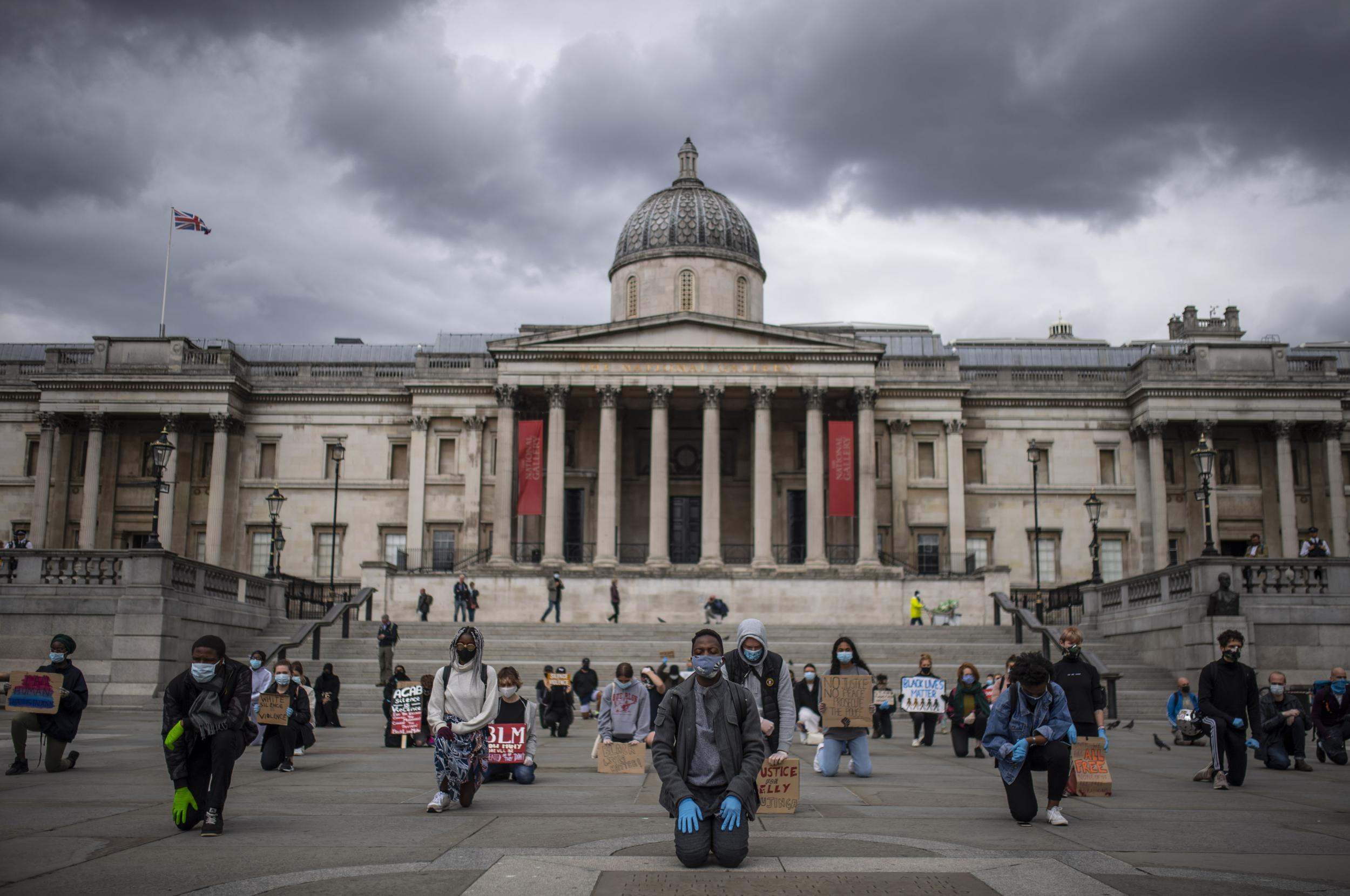
15/50 5 June 2020
Protesters kneel in Trafalgar Square during a Black Lives Matter demonstration in London, England. The death of an African-American man, George Floyd, while in the custody of Minneapolis police has sparked protests across the United States, as well as demonstrations of solidarity in many countries around the world
Getty

16/50 4 June 2020
Protestors march from Windsor Castle in solidarity with the Black Lives Matter movement
Getty
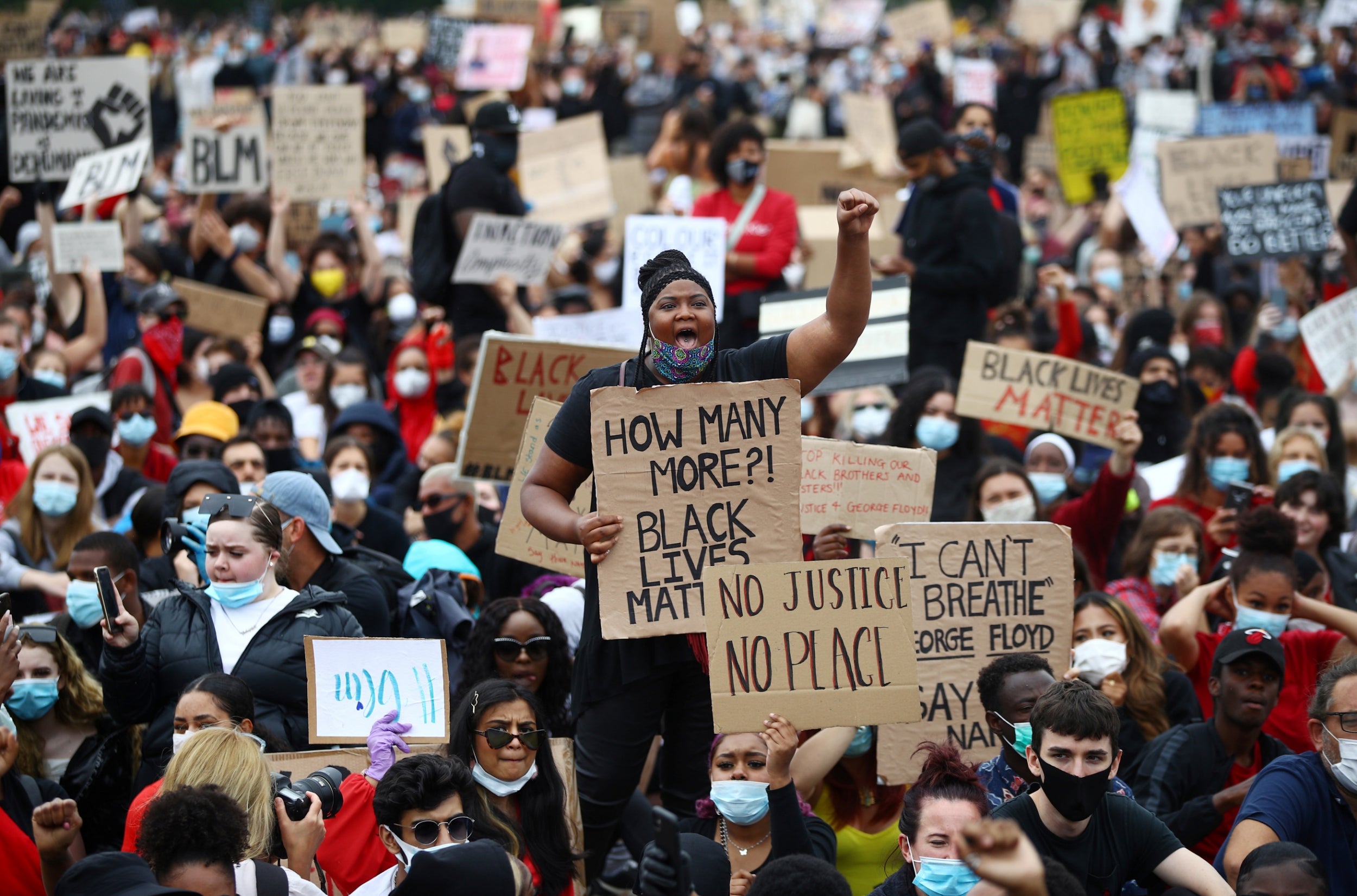
17/50 3 June 2020
People wearing face masks hold banners in Hyde Park during a Black Lives Matter protest following the death of George Floyd who died in police custody in Minneapolis
Reuters

18/50 2 June 2020
Street artist Nath Murdoch touches up his anti-racism mural in Peterborough, Cambridgeshire
PA

19/50 1 June 2020
Customers socially distance themselves as they queue to enter Ikea in Warrington. The store opening saw large queues of people and traffic on adjacent roads as it reopened after the lockdown. The furniture and housewares chain reopened its stores across England and Northern Ireland subject to several restrictions, keeping its restaurants closed and asking customers to shop alone
Getty
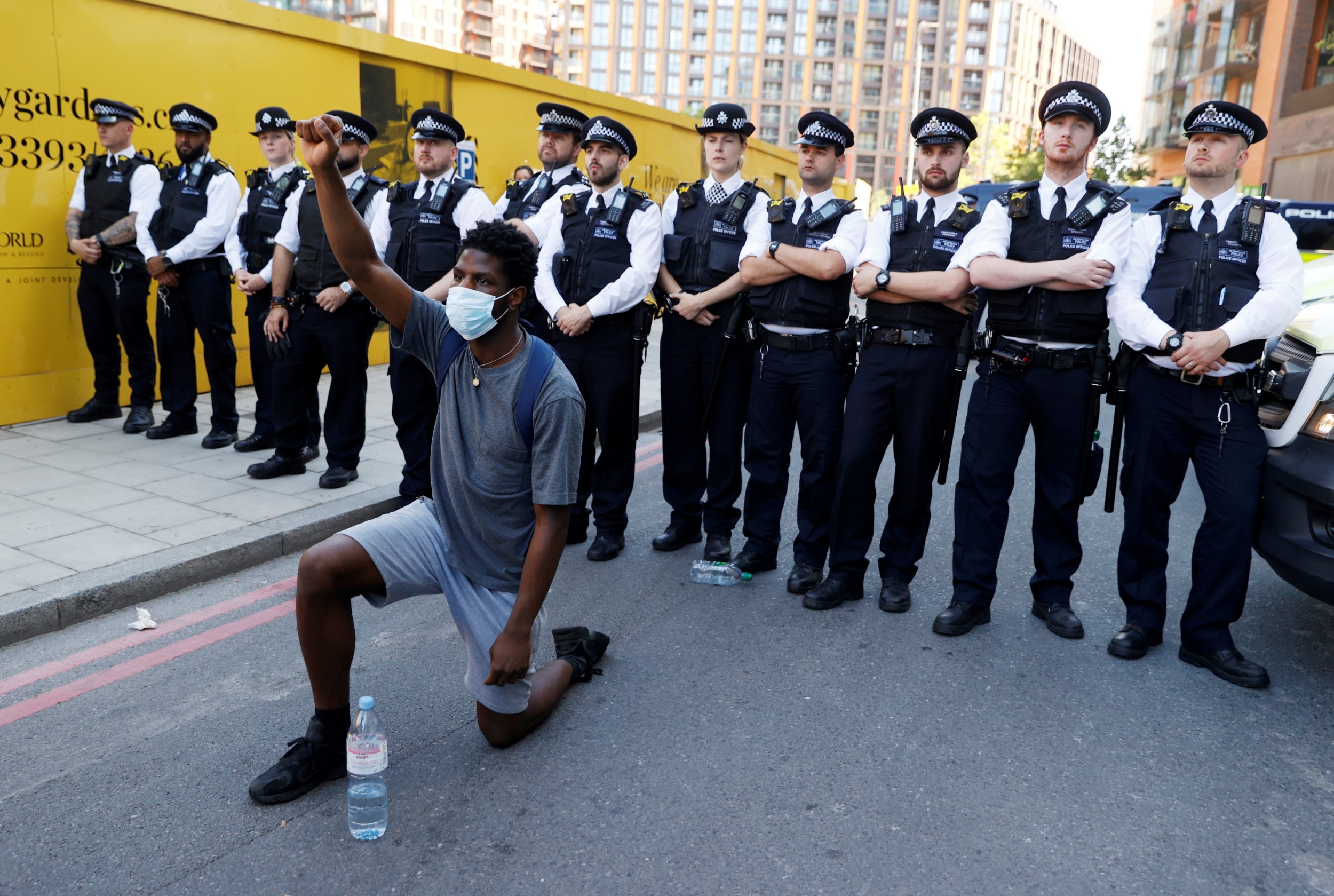
20/50 31 May 2020
A man wearing a protective face mask kneels in front of police officers during a protest against the death in Minneapolis police custody of African-American man George Floyd near the U.S. Embassy, London, Britai
Reuters

21/50 30 May 2020
Visitors at Grassholme Reservoir in Lunedale, Co Durham are able to cross an ancient packhorse bridge as work on the dam wall means water levels have dropped signifcantly to reveal this monument of the pas
UK

22/50 29 May 2020
British Tennis player Maia Lumsden in action at Bridge of Allan Tennis Club. People can meet family and friends outdoors and play sports such as golf and tennis again as the country is moving into phase one of the Scottish Government’s plan for gradually lifting lockdown
PA
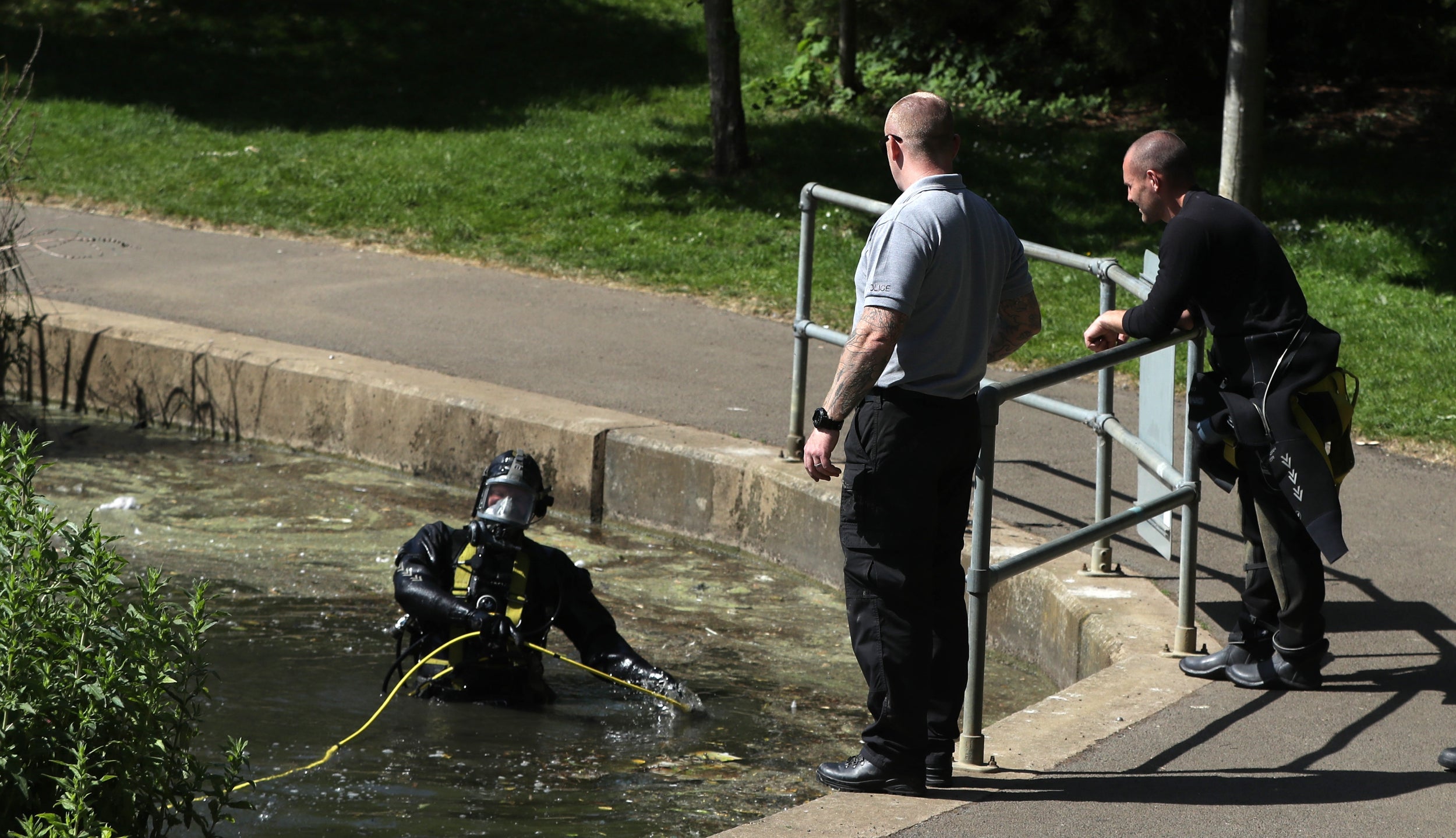
23/50 28 May 2020
A police frogman, searches for a weapon in Abington Lake in in Northampton
Getty
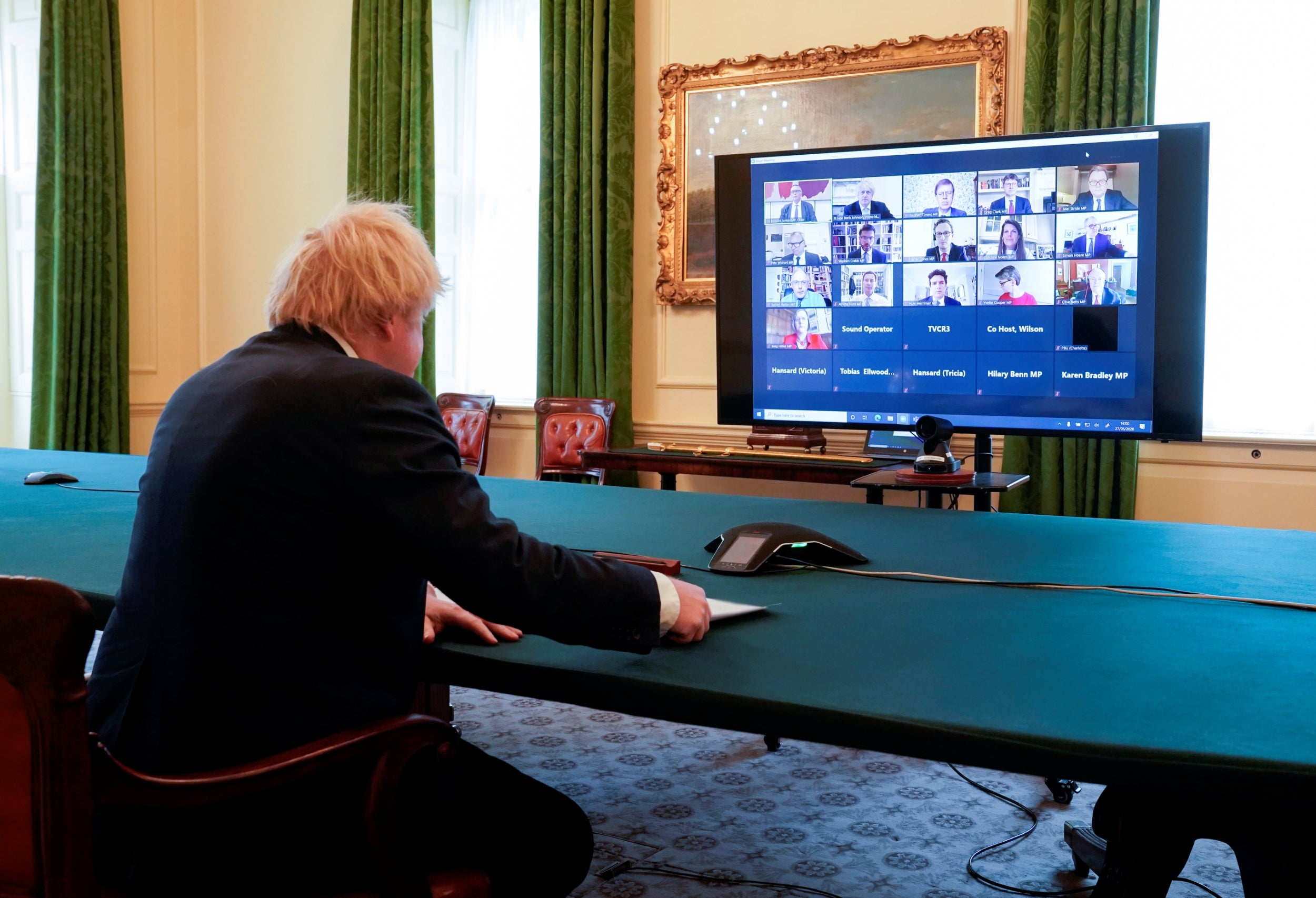
24/50 27 May 2020
Prime Minister Boris Johnson appears before the Liaison Committee via Zoom from the cabinet room at 10 Downing Street, amid the coronavirus
10 Downing Street/Reuters
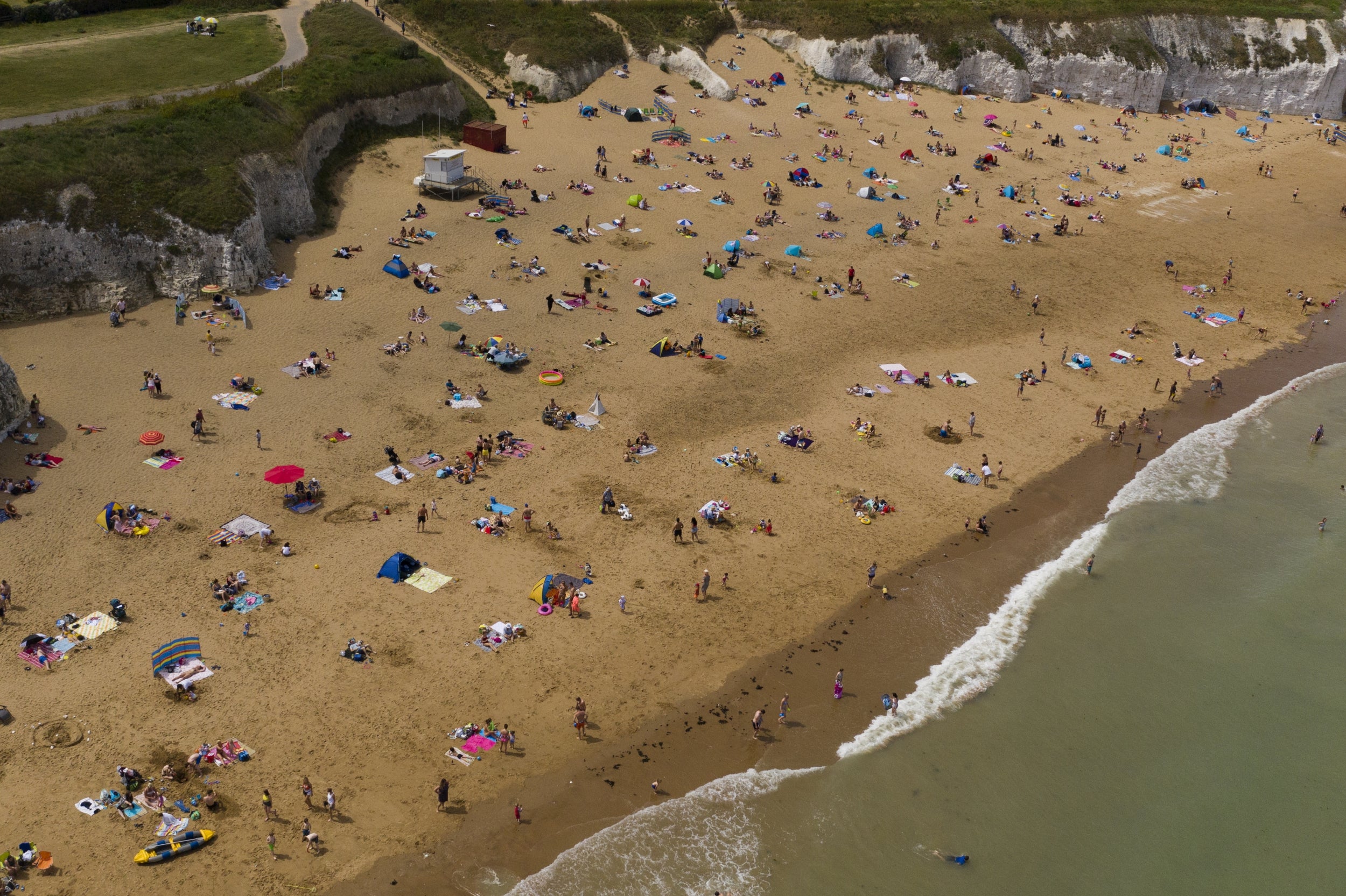
25/50 26 May 2020
Members of the public relax on the beach at Botany Bay in Margate
Getty
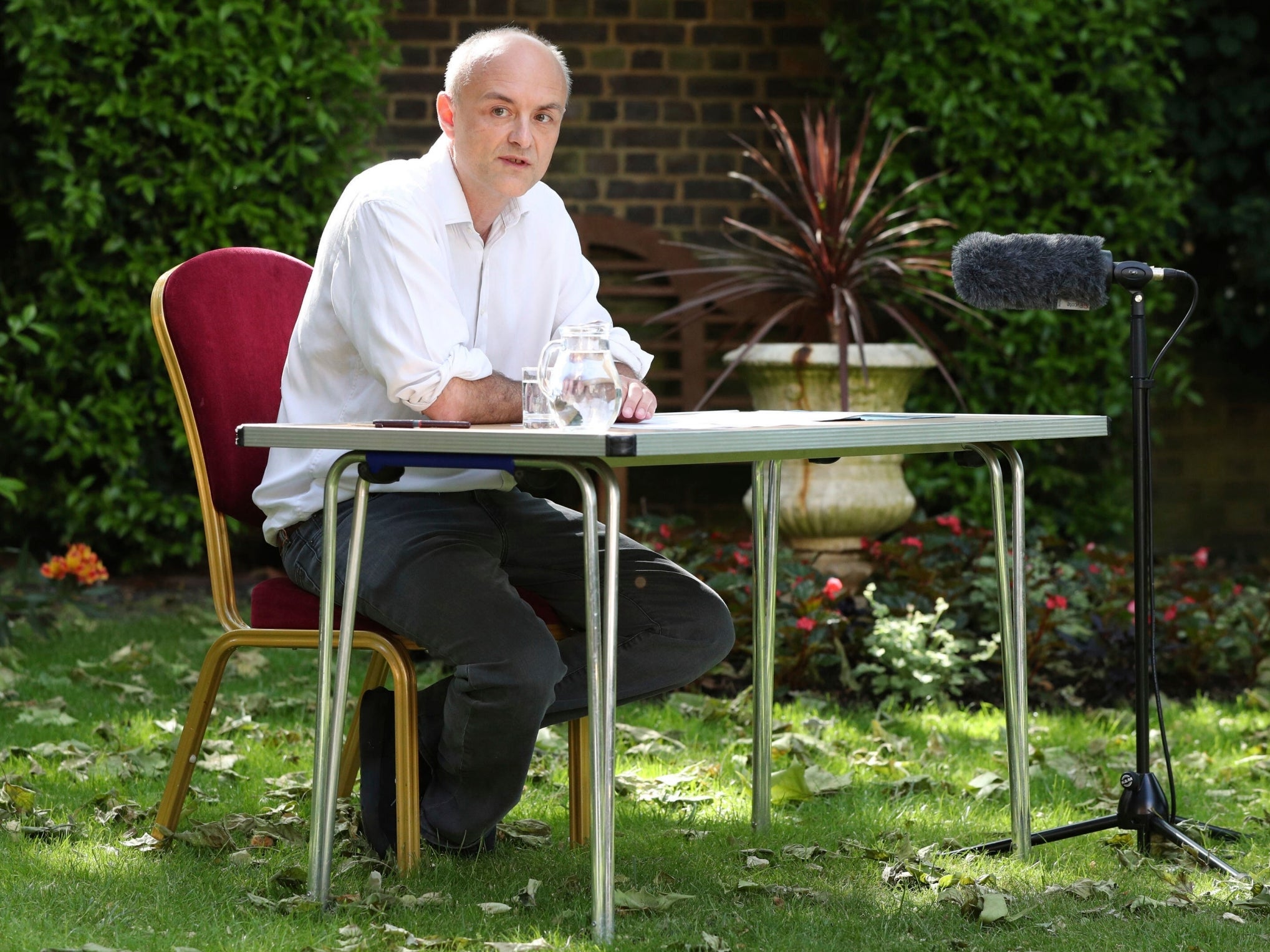
26/50 25 May 2020
Dominic Cummings, senior aide to Prime Minister Boris Johnson, makes a statement inside 10 Downing Street, London, over allegations he breached coronavirus lockdown restrictions
AP
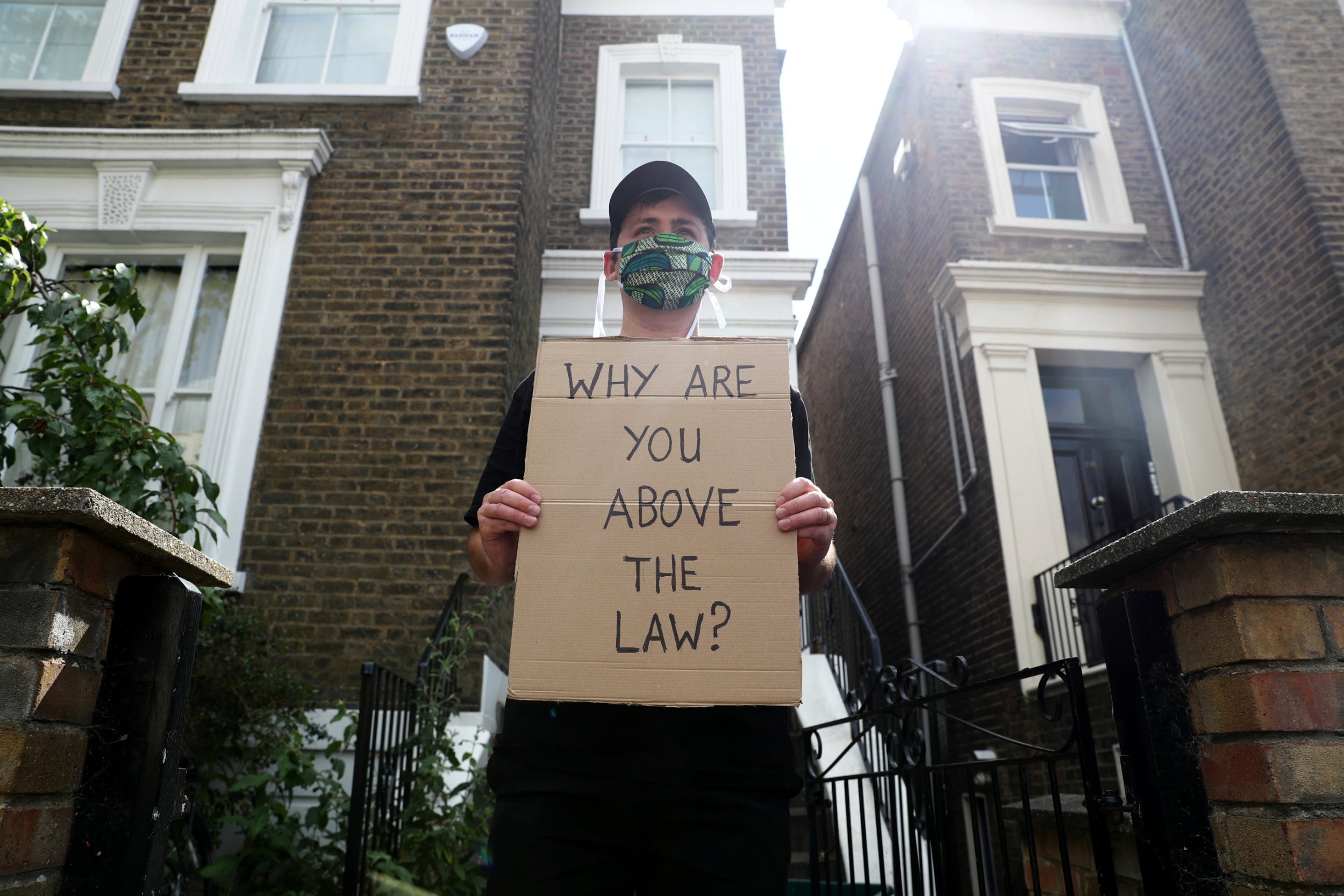
27/50 24 May 2020
A demonstrator holds a sign reading ‘Why are you above the law?’ outside the house of Dominic Cummings in London, following allegations Cummings broke coronavirus lockdown rules by travelling across the country
Reuters
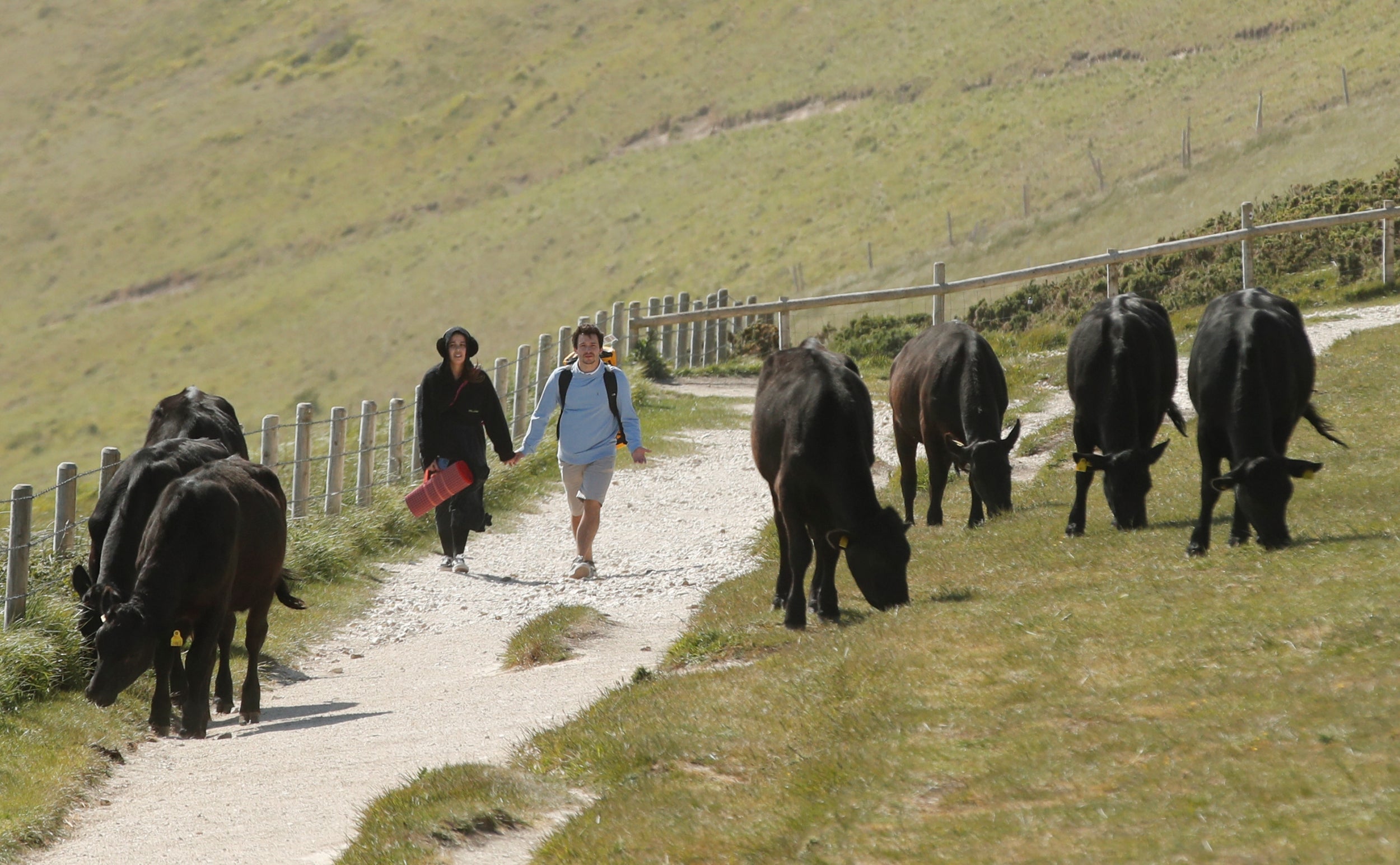
28/50 23 May 2020
People take a walk near Durdle Door as cows graze in Lulworth
Reuters
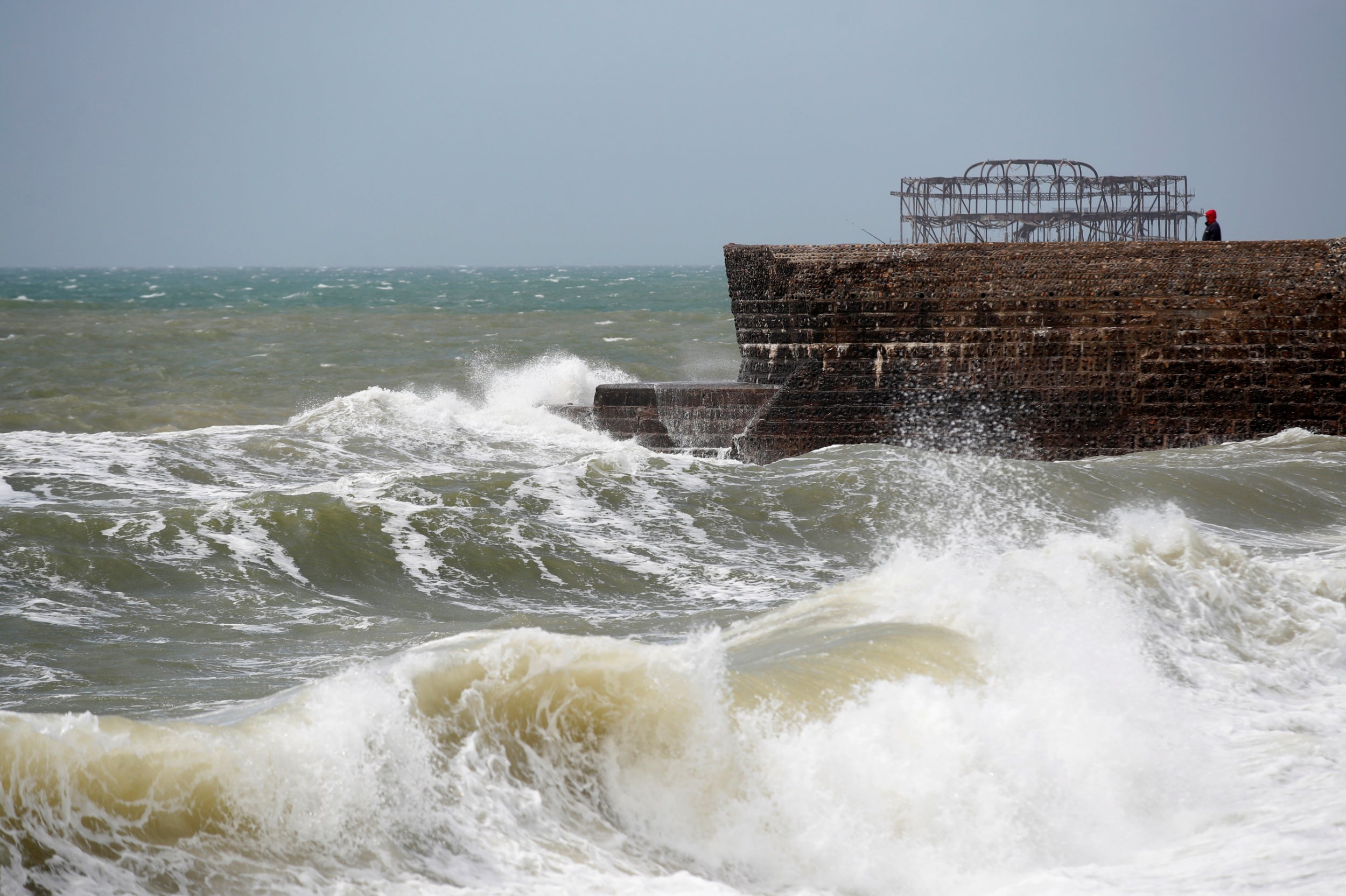
29/50 22 May 2020
Waves break onto a wall at Brighton beach
Reuters

30/50 21 May 2020
Cafe owner Francini Osorio serves customers in a trial phase during the coronavirus lockdown. Osorio has installed an air purifier and 35 clear shower curtains, which will divide customers and tables, in the Francini Cafe De Colombia, Worcester, ready for the re-opening of his business as lockdown restrictions are eased
PA
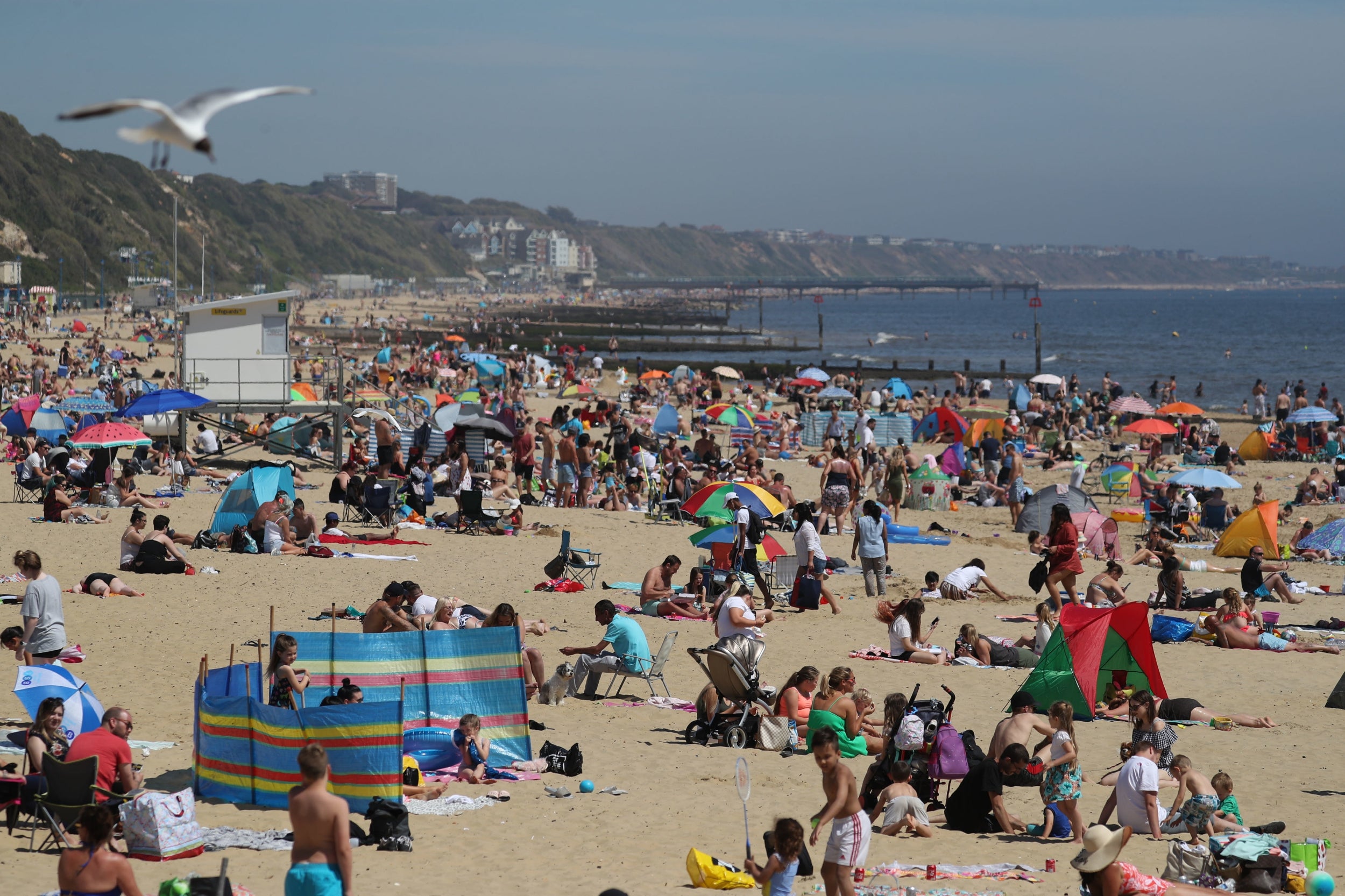
31/50 20 May 2020
People at Bournemouth beach in Dorset, as people flock to parks and beaches with lockdown measures eased. The Met Office has predicted the hottest day of the year
PA

32/50 19 May 2020
A dog jumps into the water as families relax at a Lido in London
AP

33/50 18 May 2020
A fan celebrates outside Celtic Park after Celtic were crowned champions of the Scottish Premiership. Hearts were also relegated after a decision was made to conclude the season with immediate effect
PA
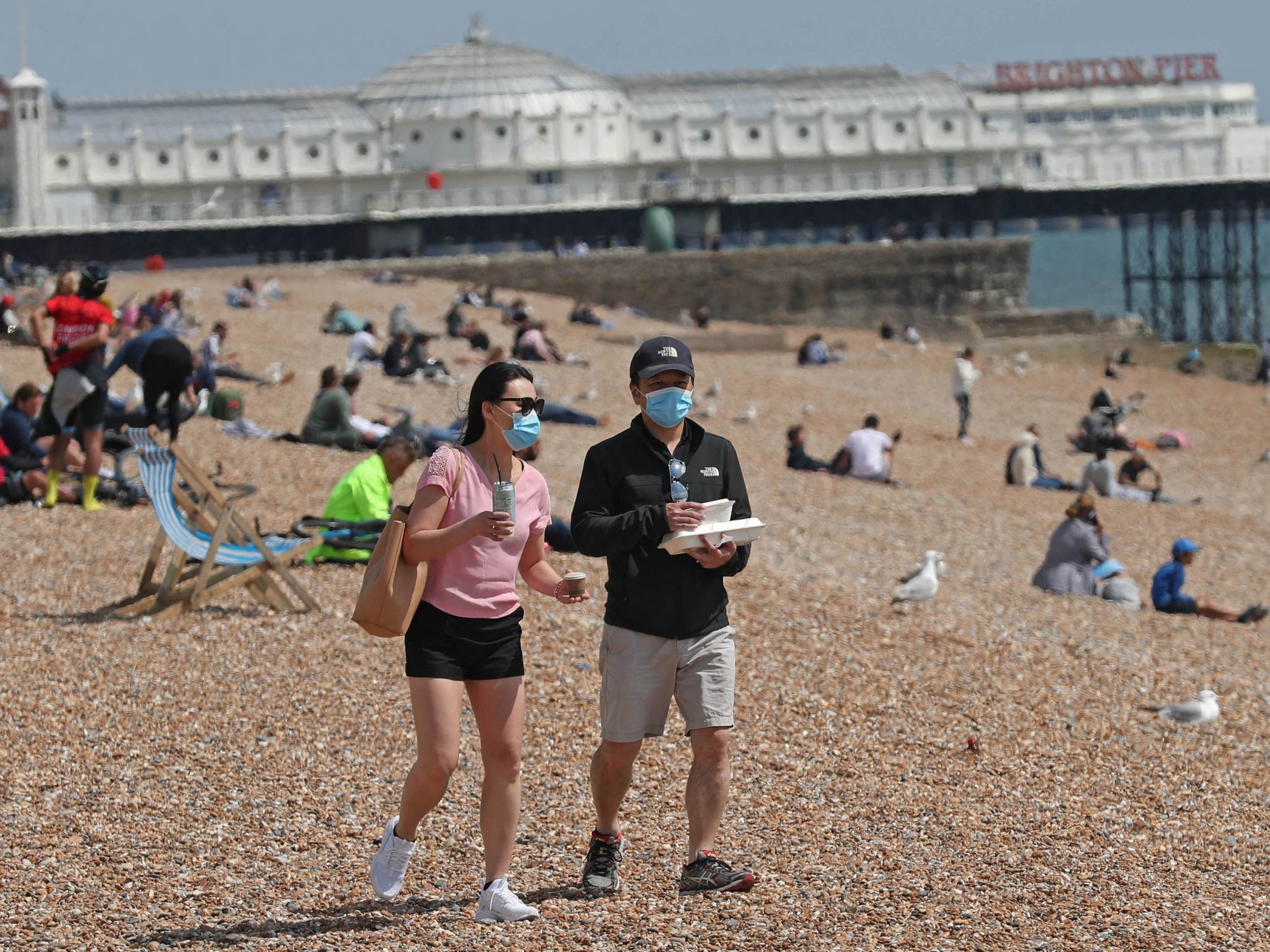
34/50 17 May 2020
People on Brighton beach after the introduction of measures to bring the country out of lockdown
PA
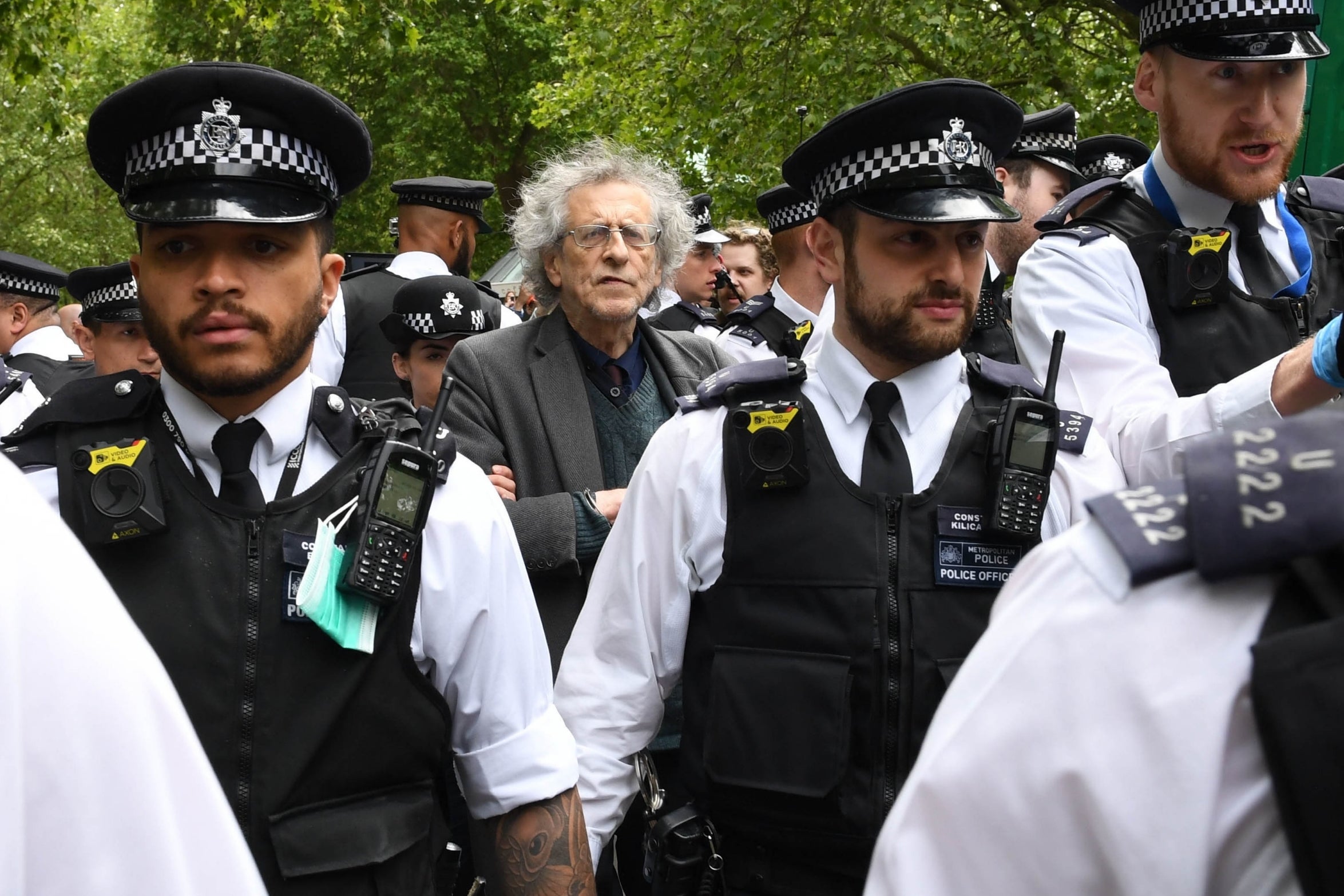
35/50 16 May 2020
Police lead away Piers Corbyn, brother of former Labour leader Jeremy Corbyn, as protesters gather in breach of lockdown rules in Hyde Park in London after the introduction of measures to bring the country out of lockdown.
PA

36/50 15 May 2020
Estonian freelance ballet dancer and choreographer, Eve Mutso performs her daily fitness routine near her home in Glasgow, Scotland
Getty

37/50 14 May 2020
Senior charge nurse Jan Ferguson views artwork “Theatre of Dott’s” by Kate Ive, inspired by Professor Norman Dott and his neurosurgery theatres at the Western General from 1960-2019. It is one of a number of artworks which sit on the walls of NHS Lothians’ Department of Clinical Neurosciences (DCN) which has been transferred into a purpose-built new home on the Little France campus in Edinburgh
PA

38/50 13 May 2020
Team GB’s karate athlete Jordan Thomas trains outside his apartment in Manchester
Reuters

39/50 12 May 2020
Nurses from central London hospitals protest on international nurses day about the chronic underfunding of the NHS and other issues surrounding the health service outside the gates of Downing Street, London
PA

40/50 11 May 2020
Waves crash at Tynemouth pier on the North East coast
PA
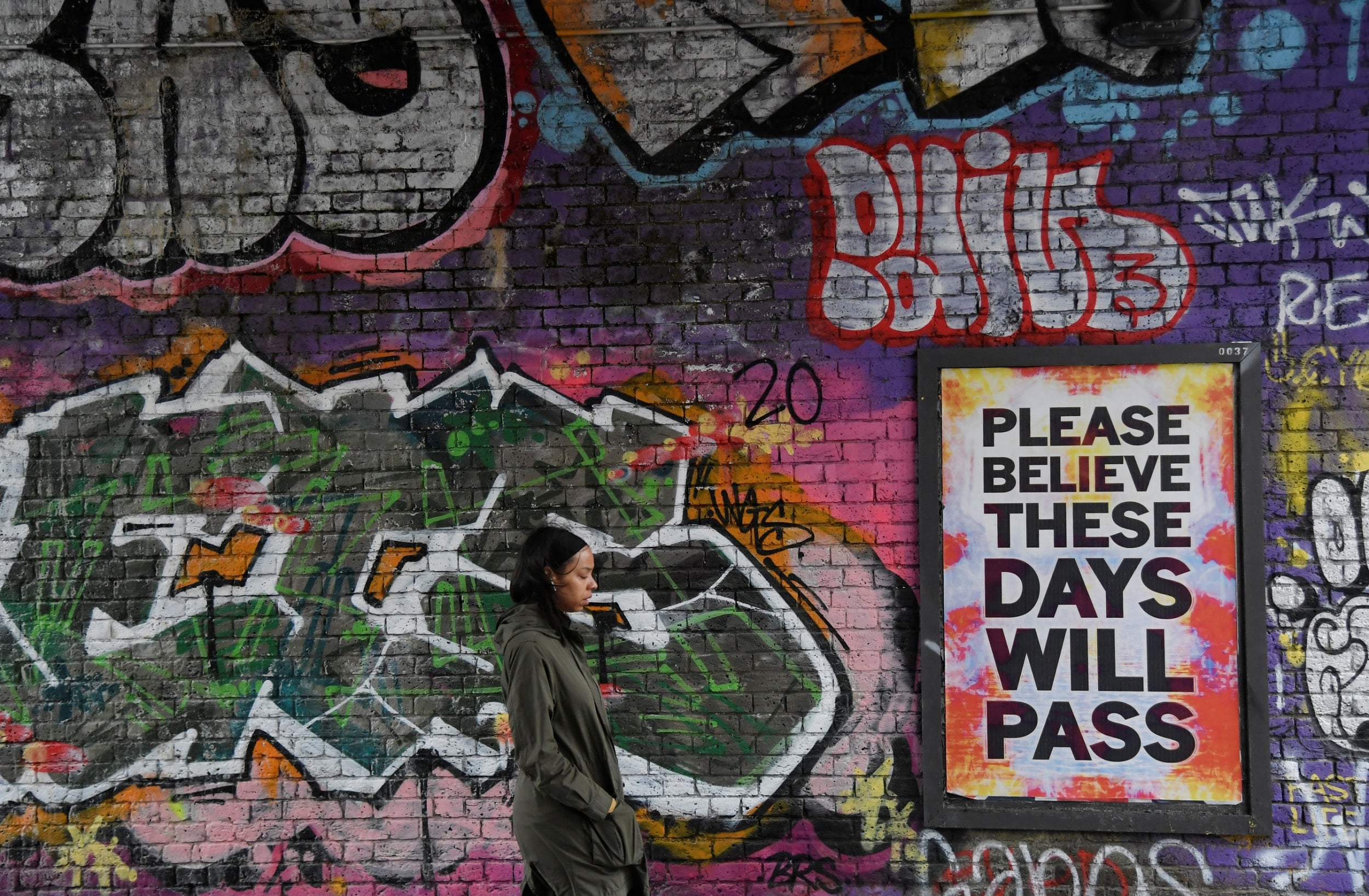
41/50 10 May 2020
A woman passes street art and a poster in East London
Reuters
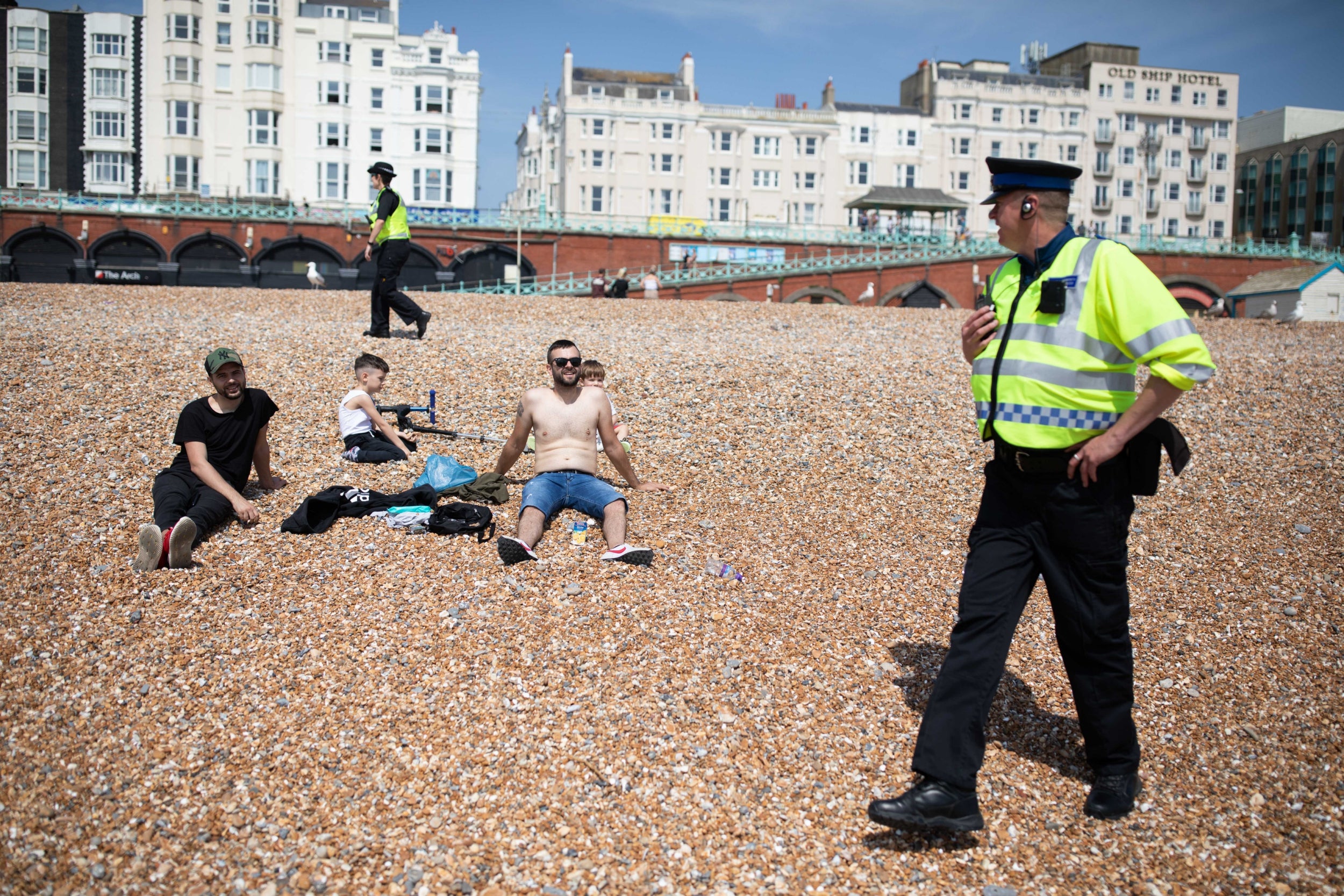
42/50 9 May 2020
Police patrol the beach in Brighton
Getty

43/50 8 May 2020
The British Royal Air Force Red Arrows conduct a fly past over the statue of former British Prime Minister Winston Churchill in London to commemorate the 75th Anniversary of Victory in Europe (VE Day) in Britain
MOD/Reuters
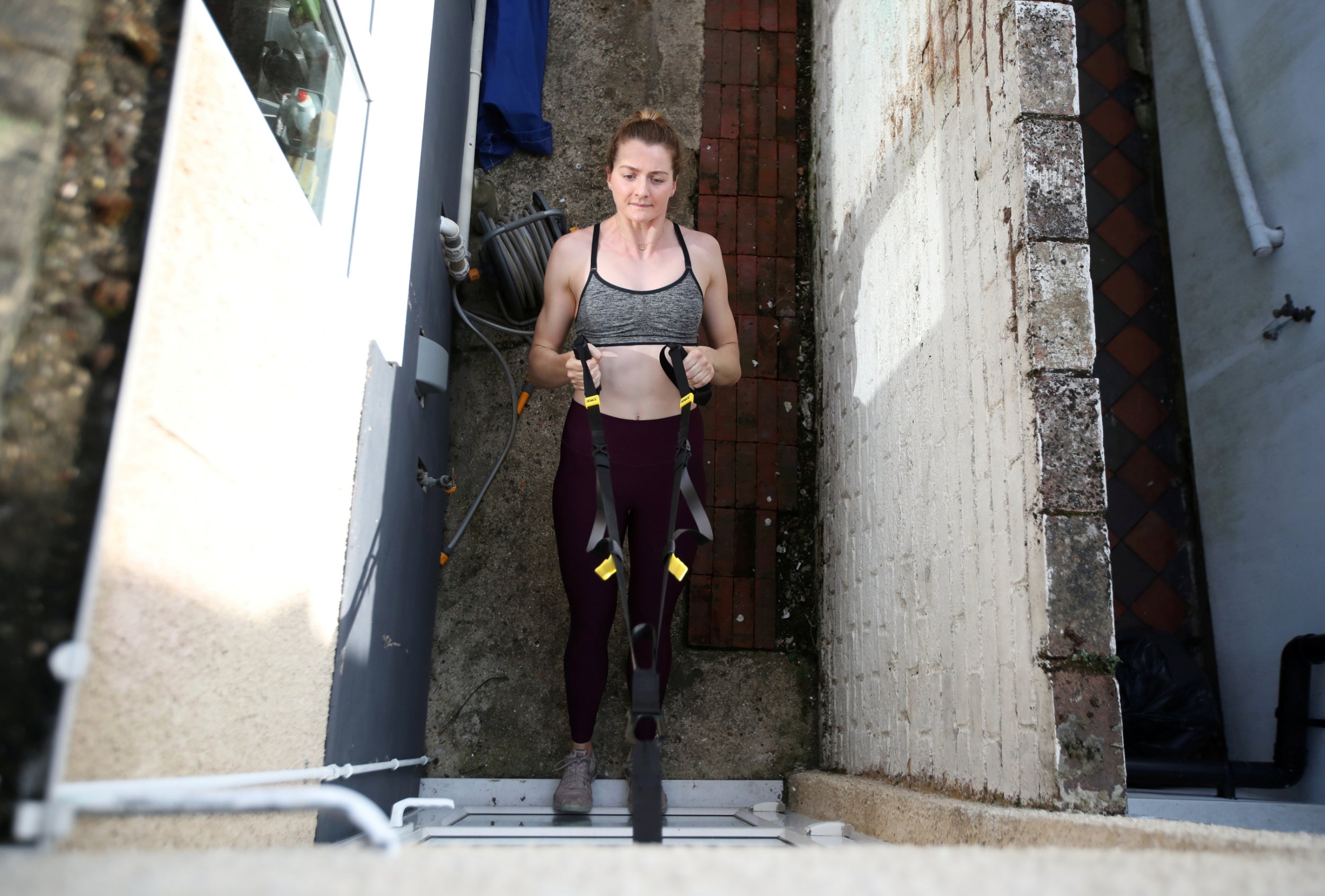
44/50 7 May 2020
Team GB sailor Eilidh McIntyre during a training session at her home in Portsmouth
Reuters
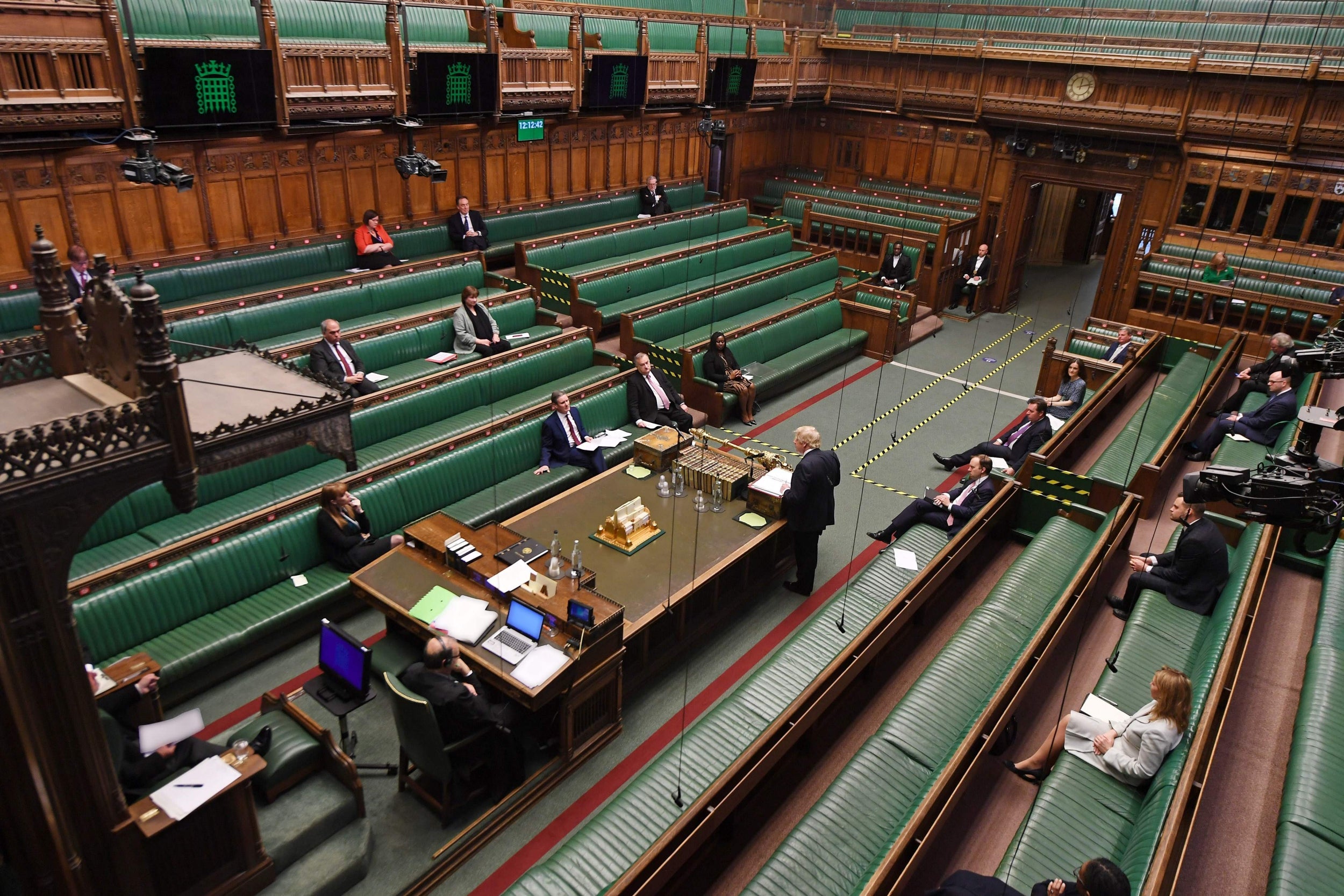
45/50 6 May 2020
Labour Party leader Keir Starmer listens to Prime Minister Boris Johnson speaking during PMQs
UK Parliament/AFP/Getty

46/50 5 May 2020
The sun appears to explode over the horizon in this montage of images captured by photographer Nick Lucas near his home in Ringwood, Hampshire. Nick took a number of pictures just a few seconds apart on a tripod mounted camera which were then combined to give the eye catching dawn image
Nick Lucas/SWNS
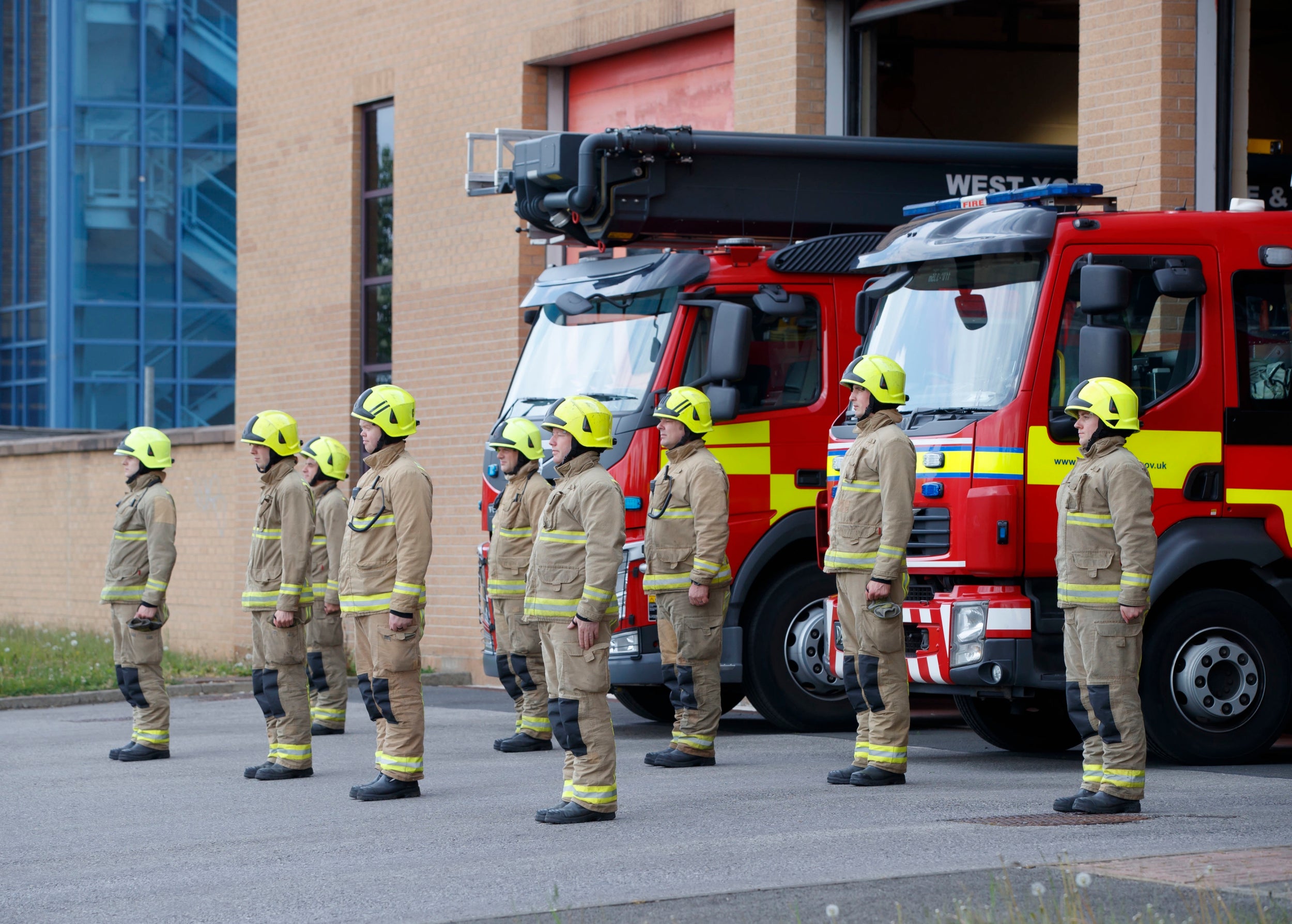
47/50 4 May 2020
Leeds Green Watch firefighters observe a minute’s silence outside the fire station in Kirkstall Rd, in memory their colleagues that lost their lives in the line of duty
PA
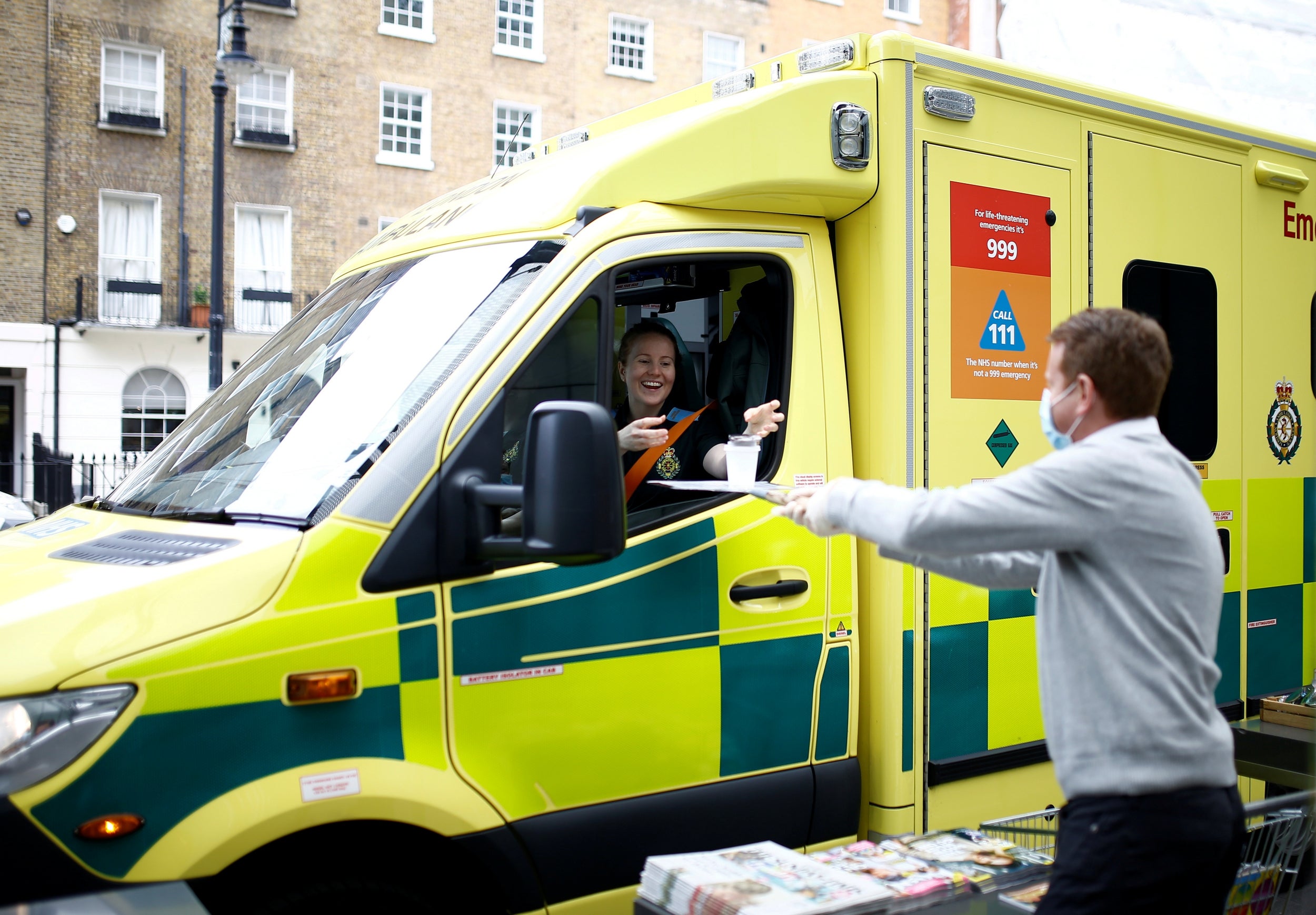
48/50 3 May 2020
Staff at The Berkeley hotel give food to ambulance workers
Reuters
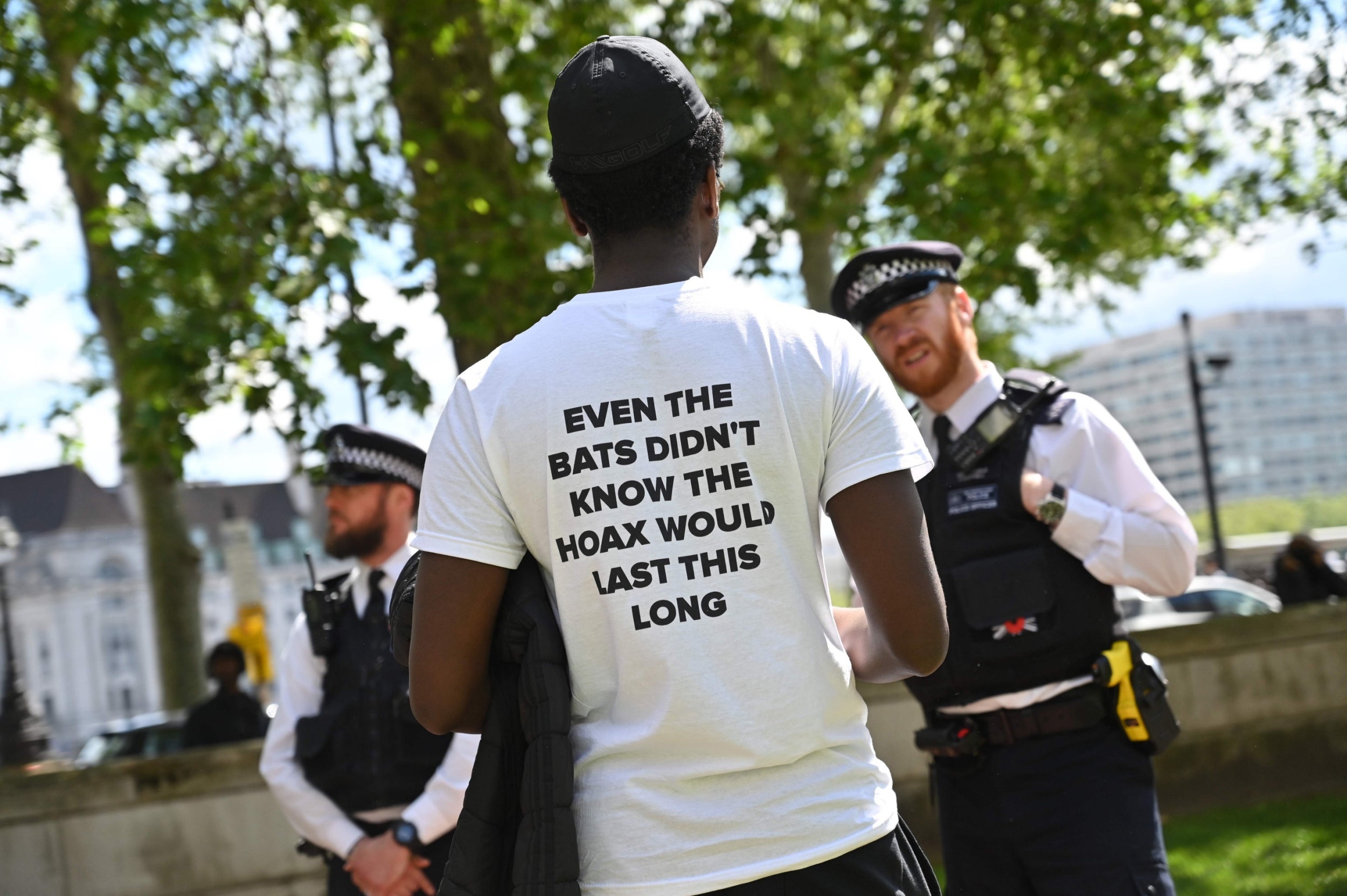
49/50 2 May 2020
One of a small group of anti-lockdown protesters speaks to a police officer as they gather outside New Scotland Yard in Victoria, London
AFP via Getty
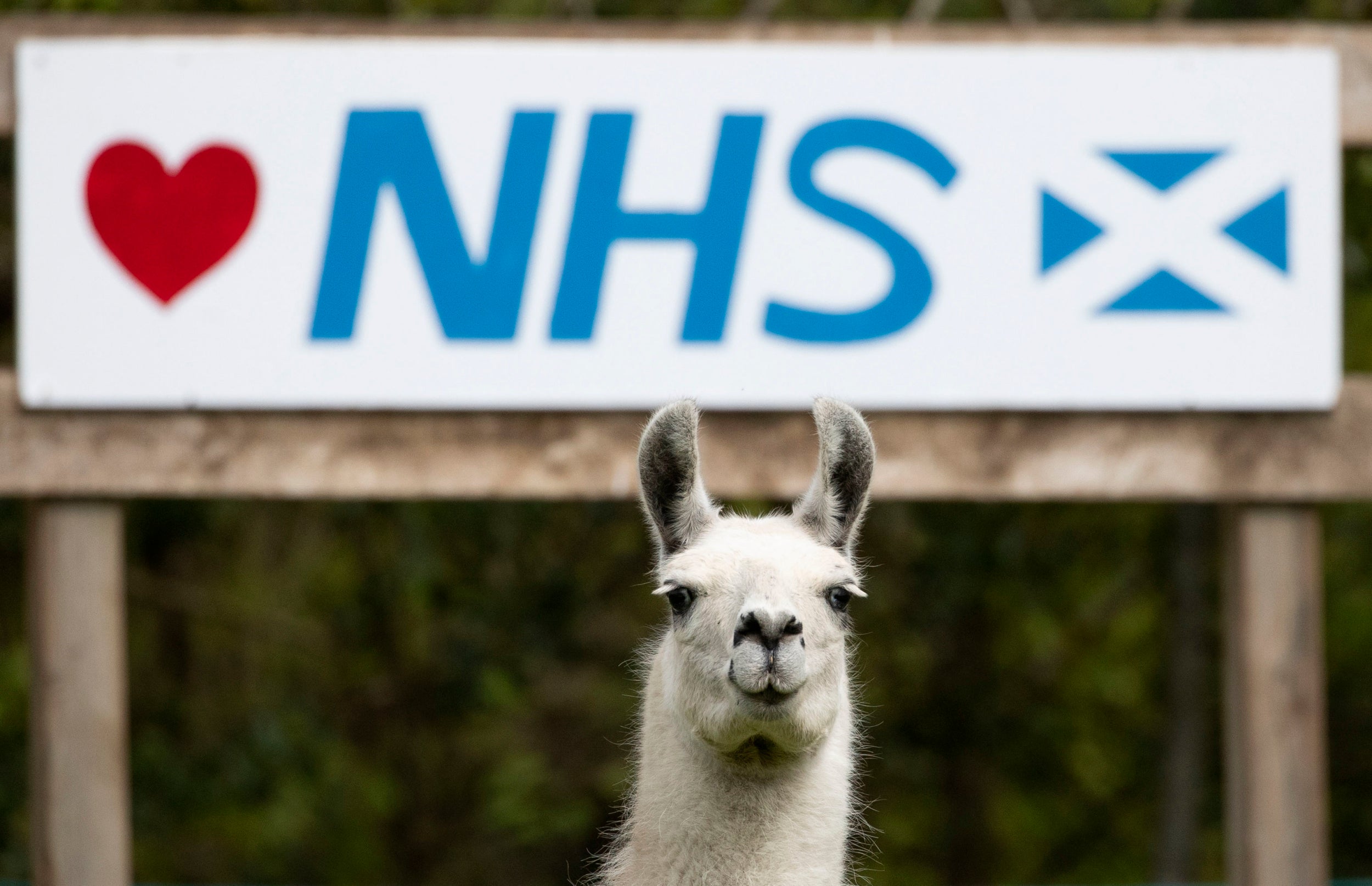
50/50 1 May 2020
Bonnie the Llama grazes in a field in the Scottish Borders alongside a sign supporting the NHS as the UK continues in lockdown
PA

1/50 19 June 2020
Bianca Walkden during a training session at the National Taekwondo Centre in Manchester
PA

2/50 18 June 2020
French President Emmanuel Macron gestures about social distancing alongside Prime Minister Boris Johnson as he arrives at Downing Street for a meeting. Macron also visited London to commemorate the 80th anniversary of former French president Charles de Gaulle’s appeal to French people to resist the Nazi occupation during World War II
AFP/Getty

3/50 17 June 2020
Players kneel, as well as, having ‘Black Lives Matter’ in place of names on their shirts prior to the start of the Premier League match between Aston Villa and Sheffield United at Villa Park in Birmingham. The league resumed after its three-month suspension because of coronavirus
AP

4/50 16 June 2020
Motakhayyel ridden by Jim Crowley, right, wins the Buckingham Palace Handicap during day one of Royal Ascot. This year, the flat racing’s biggest meeting, is behind closed doors due to the coronavirus outbreak
PA

5/50 15 June 2020
Queues form at Primark at the Rushden Lakes shopping complex after the government relaxed coronavirus lockdown laws significantly, allowing zoos, safari parks and non-essential shops to open to visitors
Getty

6/50 14 June 2020
A man kneels at a commemoration to mark the third anniversary of the Grenfell Tower fire in London. The fire claimed 72 lives on 14 June 2017
PA

7/50 13 June 2020
Protesters confront police in Whitehall near Parliament Square, during a protest by the Democratic Football Lads Alliance
PA

8/50 12 June 2020
A Black Lives Matter supporter sings to crowds who marched with her in front of the National Gallery in Trafalgar Square in London. The death of an African American man, George Floyd, while in the custody of Minneapolis police has sparked protests across the United States, as well as demonstrations of solidarity in many countries around the world
Getty

9/50 11 June 2020
Scouts show their support at the Lord Baden-Powell statue in Poole. The statue of Robert Baden-Powell on Poole Quay is to be placed in “safe storage” following concerns about his racial views
Getty

10/50 10 June 2020
Social distancing markers around the penguin enclosure at London Zoo. Staff have been preparing and are now ready for reopening next week with new signage, one-way trails for visitors to follow, and extra handwashing and sanitiser stations in place
PA

11/50 9 June 2020
Protestors hold placards and shout slogans during during a protest called by the Rhodes Must Fall campaign calling for the removal of the statue of British imperialist Cecil John Rhodes outside Oriel College, at the University of Oxford
AFP via Getty

12/50 8 June 2020
Hermione Wilson helps to install a new artwork at Jupiter Artland, Edinburgh, created as a tribute to the NHS titled “A Thousand Thank Yous” originally devised by the late Allan Kaprow which consists of colourful painted messages on cardboard and has been directed remotely by London-based artist Peter Liversidge
PA

13/50 7 June 2020
The Edward Colston statue has been pulled down by Black Lives Matter protesters in Bristol. Colston was a 17th century slave trader who has numerous landmarks named after him in Bristol
SWNS

14/50 6 June 2020
Children pose for their family in front of discarded placards fixed on a wall in Piccadilly Gardens after a Black Lives Matter demonstrations in Manchester. The death of an African-American man, George Floyd, while in the custody of Minneapolis police has sparked protests across the United States, as well as demonstrations of solidarity in many countries around the world
Getty

15/50 5 June 2020
Protesters kneel in Trafalgar Square during a Black Lives Matter demonstration in London, England. The death of an African-American man, George Floyd, while in the custody of Minneapolis police has sparked protests across the United States, as well as demonstrations of solidarity in many countries around the world
Getty

16/50 4 June 2020
Protestors march from Windsor Castle in solidarity with the Black Lives Matter movement
Getty

17/50 3 June 2020
People wearing face masks hold banners in Hyde Park during a Black Lives Matter protest following the death of George Floyd who died in police custody in Minneapolis
Reuters

18/50 2 June 2020
Street artist Nath Murdoch touches up his anti-racism mural in Peterborough, Cambridgeshire
PA

19/50 1 June 2020
Customers socially distance themselves as they queue to enter Ikea in Warrington. The store opening saw large queues of people and traffic on adjacent roads as it reopened after the lockdown. The furniture and housewares chain reopened its stores across England and Northern Ireland subject to several restrictions, keeping its restaurants closed and asking customers to shop alone
Getty

20/50 31 May 2020
A man wearing a protective face mask kneels in front of police officers during a protest against the death in Minneapolis police custody of African-American man George Floyd near the U.S. Embassy, London, Britai
Reuters

21/50 30 May 2020
Visitors at Grassholme Reservoir in Lunedale, Co Durham are able to cross an ancient packhorse bridge as work on the dam wall means water levels have dropped signifcantly to reveal this monument of the pas
UK

22/50 29 May 2020
British Tennis player Maia Lumsden in action at Bridge of Allan Tennis Club. People can meet family and friends outdoors and play sports such as golf and tennis again as the country is moving into phase one of the Scottish Government’s plan for gradually lifting lockdown
PA

23/50 28 May 2020
A police frogman, searches for a weapon in Abington Lake in in Northampton
Getty

24/50 27 May 2020
Prime Minister Boris Johnson appears before the Liaison Committee via Zoom from the cabinet room at 10 Downing Street, amid the coronavirus
10 Downing Street/Reuters

25/50 26 May 2020
Members of the public relax on the beach at Botany Bay in Margate
Getty

26/50 25 May 2020
Dominic Cummings, senior aide to Prime Minister Boris Johnson, makes a statement inside 10 Downing Street, London, over allegations he breached coronavirus lockdown restrictions
AP

27/50 24 May 2020
A demonstrator holds a sign reading ‘Why are you above the law?’ outside the house of Dominic Cummings in London, following allegations Cummings broke coronavirus lockdown rules by travelling across the country
Reuters

28/50 23 May 2020
People take a walk near Durdle Door as cows graze in Lulworth
Reuters

29/50 22 May 2020
Waves break onto a wall at Brighton beach
Reuters

30/50 21 May 2020
Cafe owner Francini Osorio serves customers in a trial phase during the coronavirus lockdown. Osorio has installed an air purifier and 35 clear shower curtains, which will divide customers and tables, in the Francini Cafe De Colombia, Worcester, ready for the re-opening of his business as lockdown restrictions are eased
PA

31/50 20 May 2020
People at Bournemouth beach in Dorset, as people flock to parks and beaches with lockdown measures eased. The Met Office has predicted the hottest day of the year
PA

32/50 19 May 2020
A dog jumps into the water as families relax at a Lido in London
AP

33/50 18 May 2020
A fan celebrates outside Celtic Park after Celtic were crowned champions of the Scottish Premiership. Hearts were also relegated after a decision was made to conclude the season with immediate effect
PA

34/50 17 May 2020
People on Brighton beach after the introduction of measures to bring the country out of lockdown
PA

35/50 16 May 2020
Police lead away Piers Corbyn, brother of former Labour leader Jeremy Corbyn, as protesters gather in breach of lockdown rules in Hyde Park in London after the introduction of measures to bring the country out of lockdown.
PA

36/50 15 May 2020
Estonian freelance ballet dancer and choreographer, Eve Mutso performs her daily fitness routine near her home in Glasgow, Scotland
Getty

37/50 14 May 2020
Senior charge nurse Jan Ferguson views artwork “Theatre of Dott’s” by Kate Ive, inspired by Professor Norman Dott and his neurosurgery theatres at the Western General from 1960-2019. It is one of a number of artworks which sit on the walls of NHS Lothians’ Department of Clinical Neurosciences (DCN) which has been transferred into a purpose-built new home on the Little France campus in Edinburgh
PA

38/50 13 May 2020
Team GB’s karate athlete Jordan Thomas trains outside his apartment in Manchester
Reuters

39/50 12 May 2020
Nurses from central London hospitals protest on international nurses day about the chronic underfunding of the NHS and other issues surrounding the health service outside the gates of Downing Street, London
PA

40/50 11 May 2020
Waves crash at Tynemouth pier on the North East coast
PA

41/50 10 May 2020
A woman passes street art and a poster in East London
Reuters

42/50 9 May 2020
Police patrol the beach in Brighton
Getty

43/50 8 May 2020
The British Royal Air Force Red Arrows conduct a fly past over the statue of former British Prime Minister Winston Churchill in London to commemorate the 75th Anniversary of Victory in Europe (VE Day) in Britain
MOD/Reuters

44/50 7 May 2020
Team GB sailor Eilidh McIntyre during a training session at her home in Portsmouth
Reuters

45/50 6 May 2020
Labour Party leader Keir Starmer listens to Prime Minister Boris Johnson speaking during PMQs
UK Parliament/AFP/Getty

46/50 5 May 2020
The sun appears to explode over the horizon in this montage of images captured by photographer Nick Lucas near his home in Ringwood, Hampshire. Nick took a number of pictures just a few seconds apart on a tripod mounted camera which were then combined to give the eye catching dawn image
Nick Lucas/SWNS

47/50 4 May 2020
Leeds Green Watch firefighters observe a minute’s silence outside the fire station in Kirkstall Rd, in memory their colleagues that lost their lives in the line of duty
PA

48/50 3 May 2020
Staff at The Berkeley hotel give food to ambulance workers
Reuters

49/50 2 May 2020
One of a small group of anti-lockdown protesters speaks to a police officer as they gather outside New Scotland Yard in Victoria, London
AFP via Getty

50/50 1 May 2020
Bonnie the Llama grazes in a field in the Scottish Borders alongside a sign supporting the NHS as the UK continues in lockdown
PA
He said we should be “delighted” that coronavirus transmission is no longer high, but recognise that changing behaviour now could lead to “real difficulty”.
The green light for the change came from the government’s new expert Joint Biosecurity Centre, which has been created specifically to help fight the pandemic.
The reduction in the alert level was jointly approved by the chief medical officers of England, Scotland, Wales and Northern Ireland.
Ministers are struggling to revive the UK economy while ensuring lockdown rules are stringent enough to prevent a second peak.
Amid growing pressure on ministers, the fall in the alert level is likely to pave the way for further relaxations of lockdown restrictions.
The latest news on Brexit, politics and beyond direct to your inbox
Within hours of the announcement, Boris Johnson hinted that the two-metre social distancing rule could soon be eased for schools.
Later, the education secretary, Gavin Williamson, suggested the requirement for schools to teach pupils in “bubbles” of no more than 15 could also be relaxed.
The change in the alert level will also raise hopes that ministers will soon confirm the reopening of pubs and restaurants and give permission for overnight stays in hotels and B&Bs in England from 4 July.
Dr Stephen Griffin, associate professor in the School of Medicine at the University of Leeds, said: “This news is a sign of the decreasing levels of circulating Sars-CoV2 infection within the UK population and will be welcomed by many. However, it is vital that this is not misinterpreted as a green light for life to revert to normal, or for unnecessary risks to be taken. Level 3 still reflects that an epidemic is ongoing and that significant numbers of new infections and, sadly, deaths, are occurring every day. Moreover, many patients are suffering from the longer-term consequences of Covid-19.”
Matt Keeling, professor of populations and disease at the University of Warwick, said the move was “expected and is justified by the current epidemiological situation”.
The shadow health secretary, Jonathan Ashworth, warned that now was not the time for complacency.
“We are past the peak with, thankfully, hospitalisations and deaths coming down. But this virus remains deadly; we have one of the highest numbers of excess deaths in the world and this is no time for complacency,” he said.
“We still need more testing, including regular testing of NHS staff and a functional tracing regime in place.”



